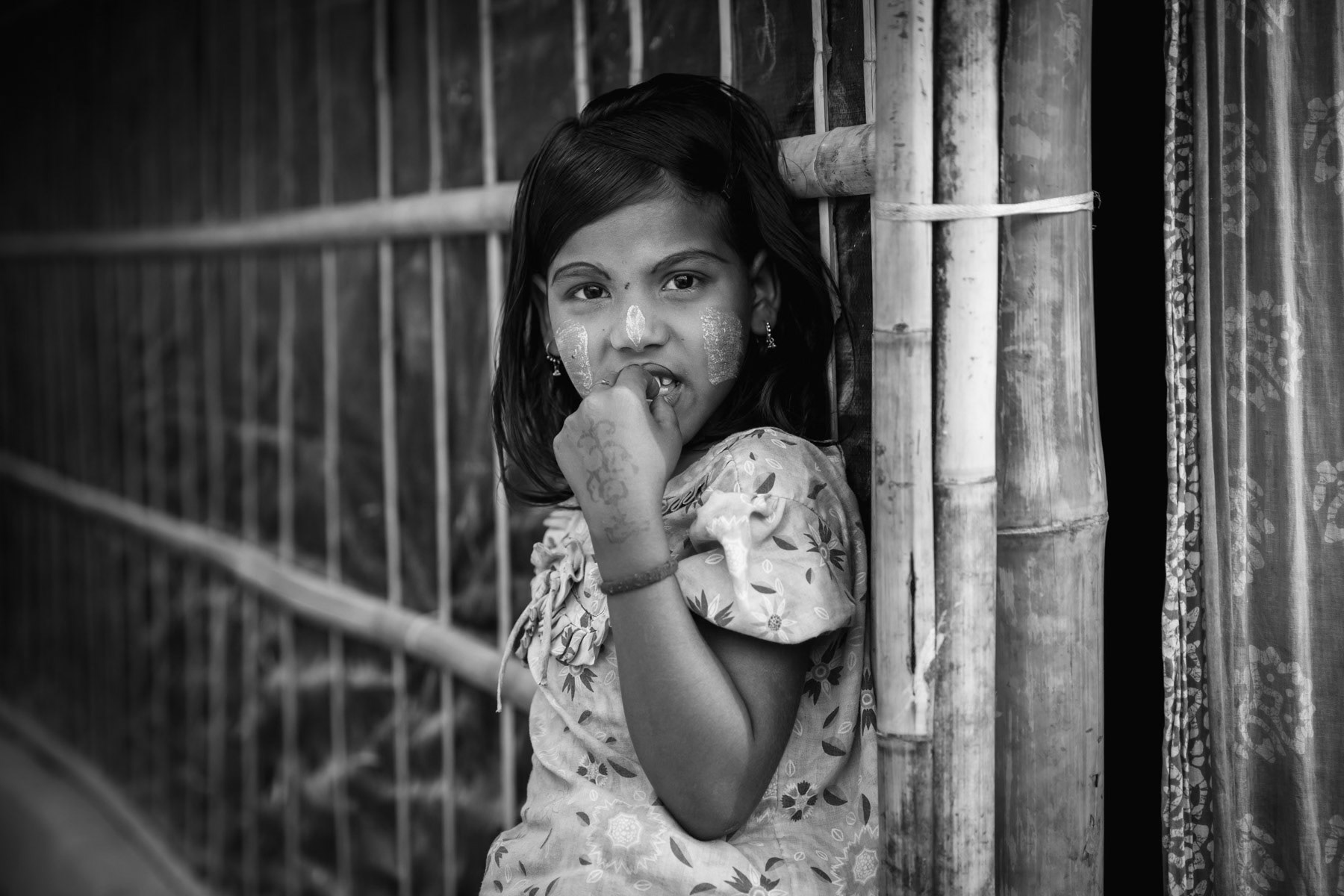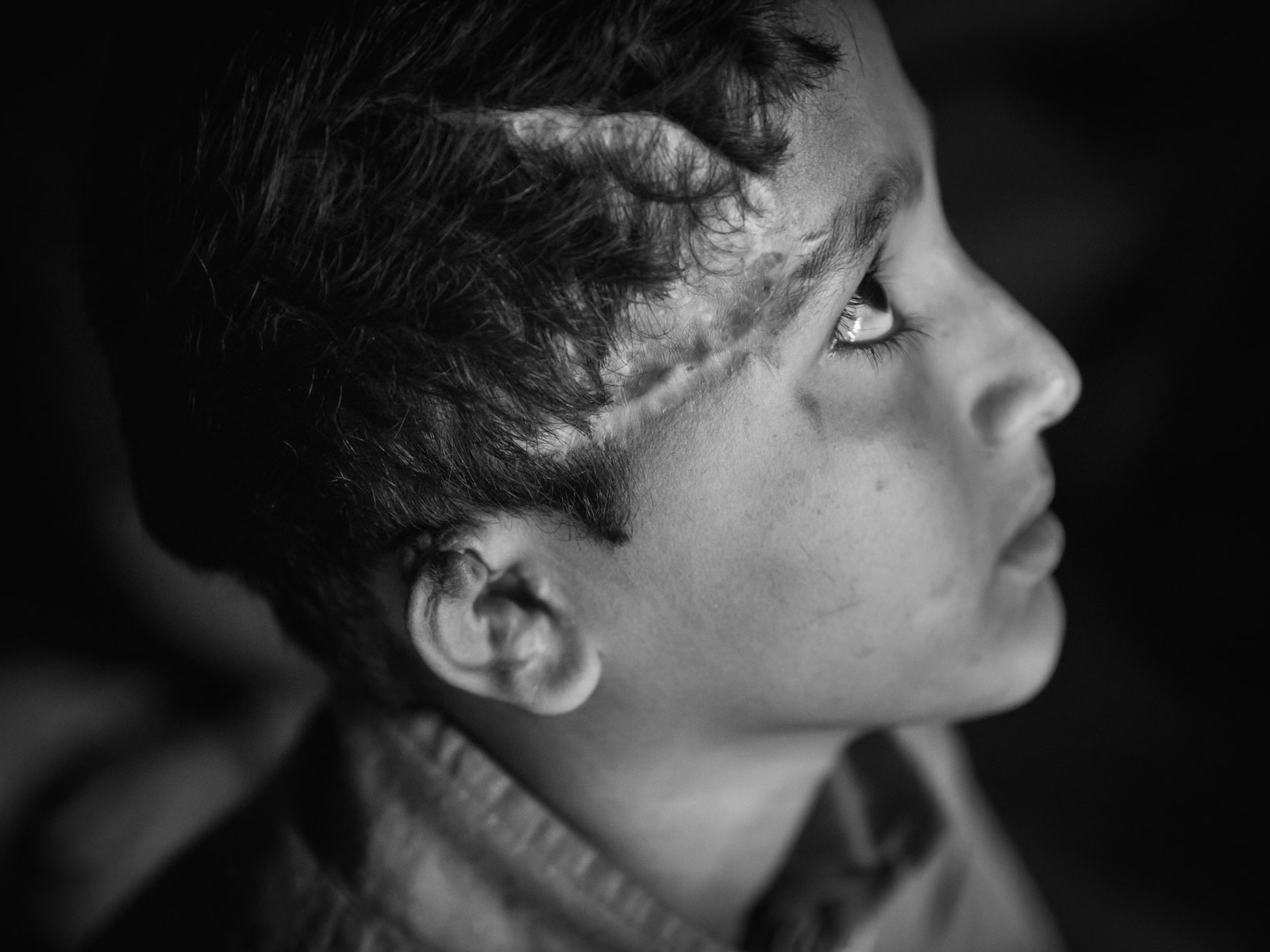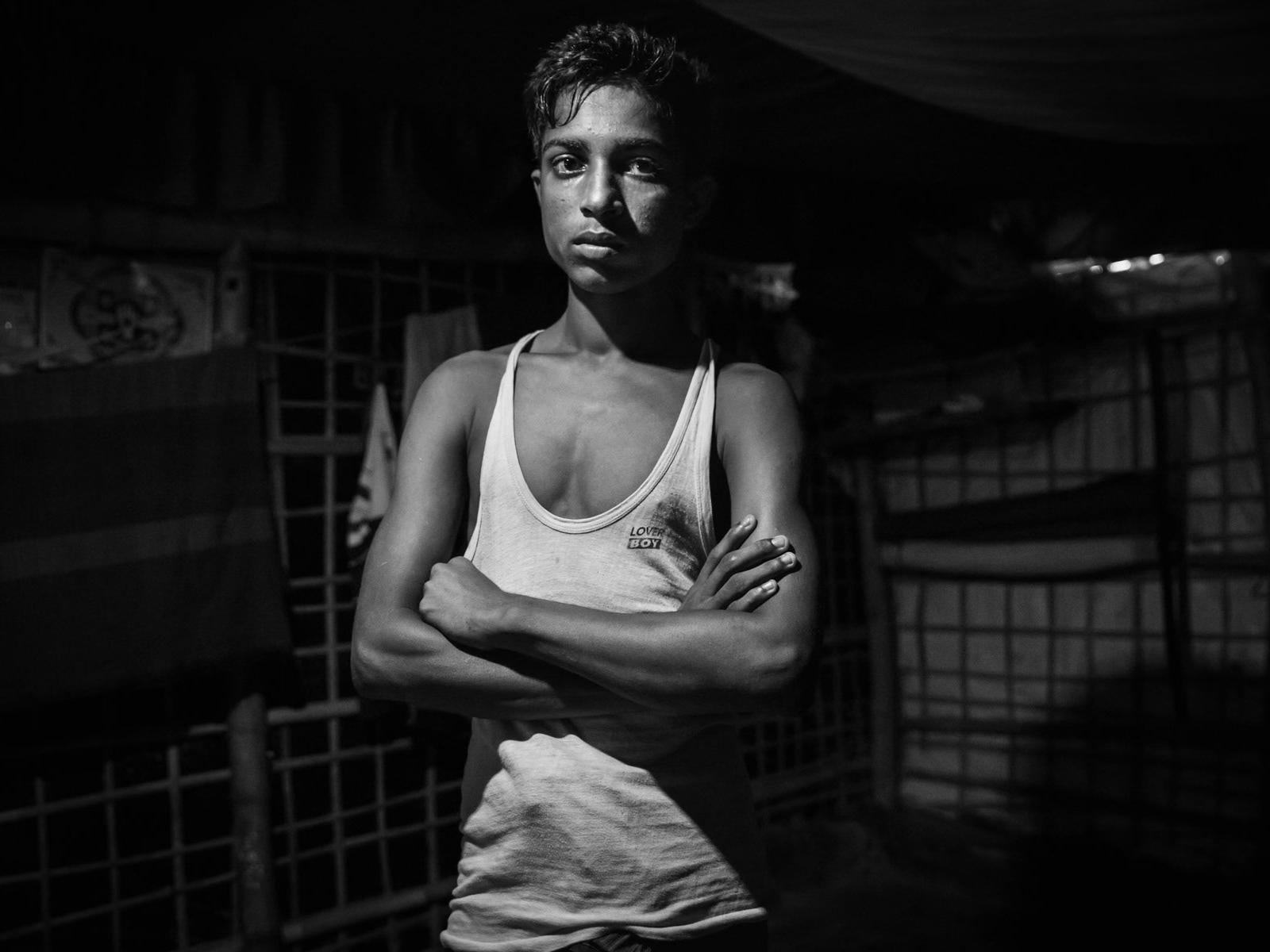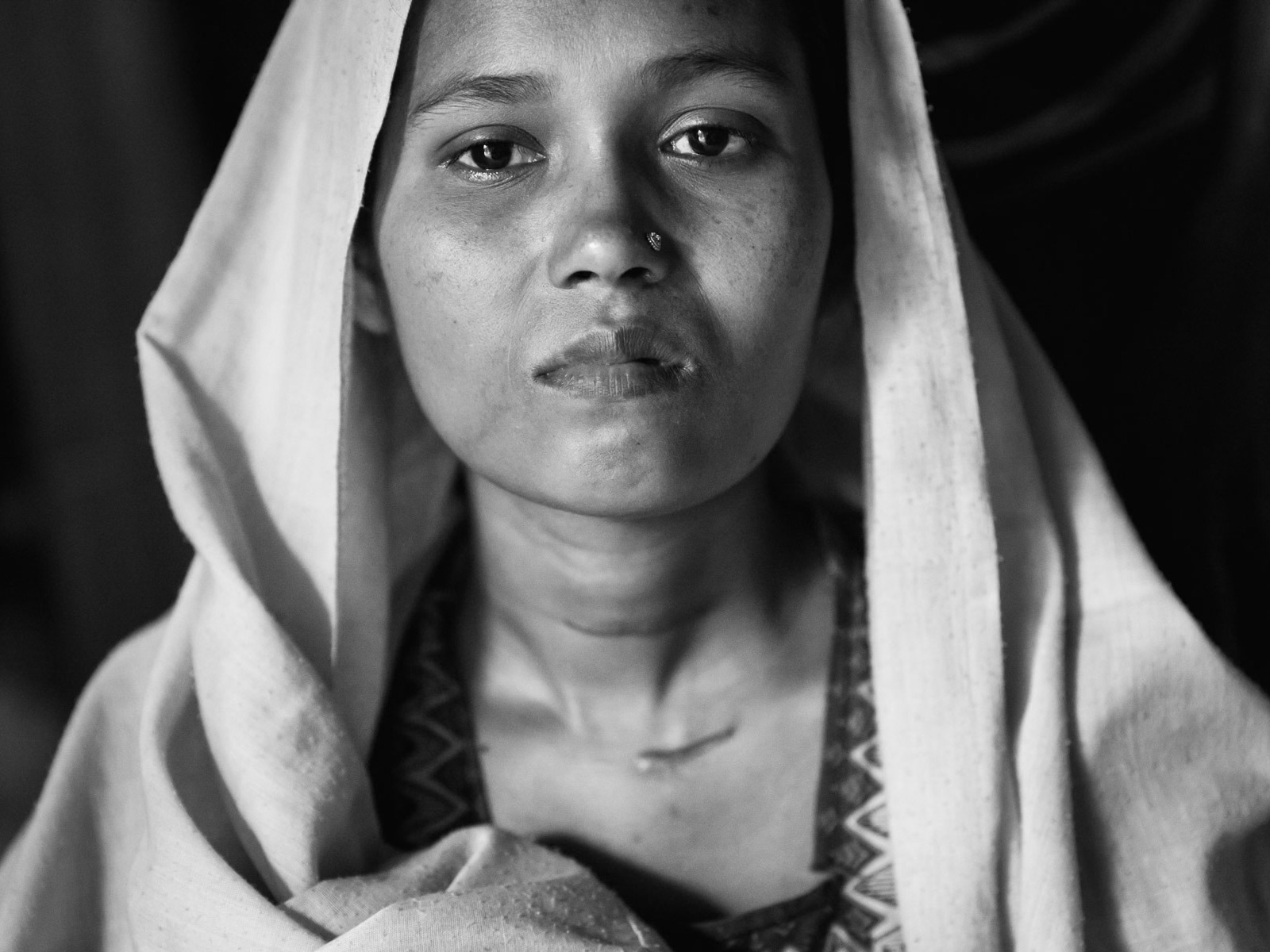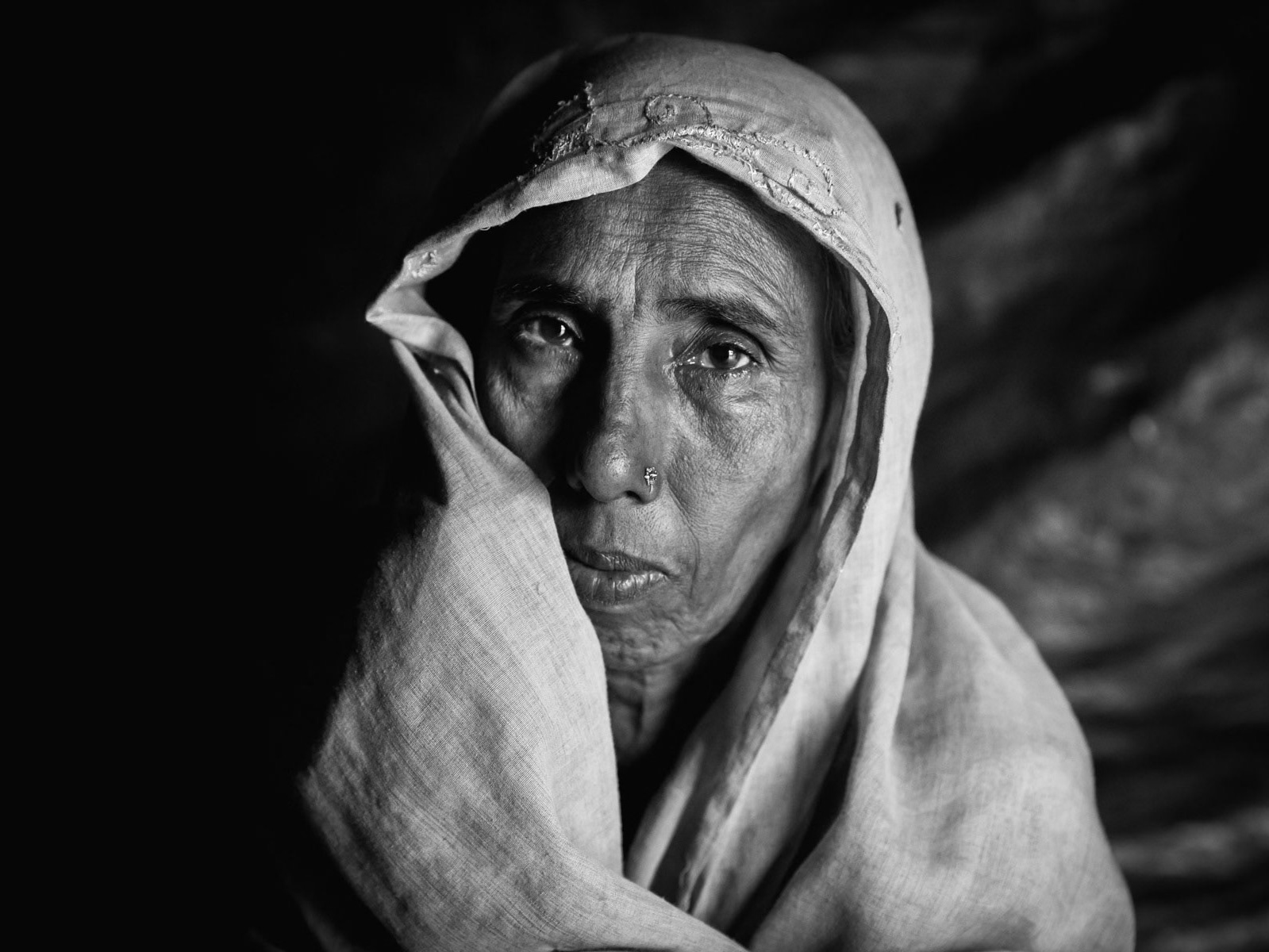Between 2016 and 2017, the Rohingya, a Muslim minority group in Myanmar's Rakhine State, faced extreme persecution, leading many observers to label the violence as ethnic cleansing or even genocide. In response to attacks on security posts by Rohingya militants, Myanmar's military carried out brutal operations targeting civilians, involving mass killings, torture, and sexual violence. Entire villages were destroyed, and families were displaced, with the military's actions resembling signs of genocide as outlined by the United Nations Genocide Convention. Women and girls were particularly subjected to horrific sexual violence, which was used as a weapon of war. Babies and children were killed, and many survivors were left with severe physical and psychological trauma.
The international community has condemned these actions, and in 2019, the International Court of Justice (ICJ) ruled that Myanmar must take steps to prevent further genocide and preserve evidence. However, the political challenges of holding Myanmar accountable have hindered meaningful action. As a result, hundreds of thousands of Rohingya fled to Bangladesh, facing dire conditions in overcrowded refugee camps. Despite humanitarian efforts, refugees continue to suffer from inadequate shelter, sanitation, and healthcare. Many survivors are emotionally scarred, and repatriation remains uncertain, leaving the Rohingya in a prolonged state of displacement and fear.
The ongoing crisis highlights the failure of the international community to prevent genocide and protect vulnerable populations, leaving the Rohingya with little hope for justice or a better future.
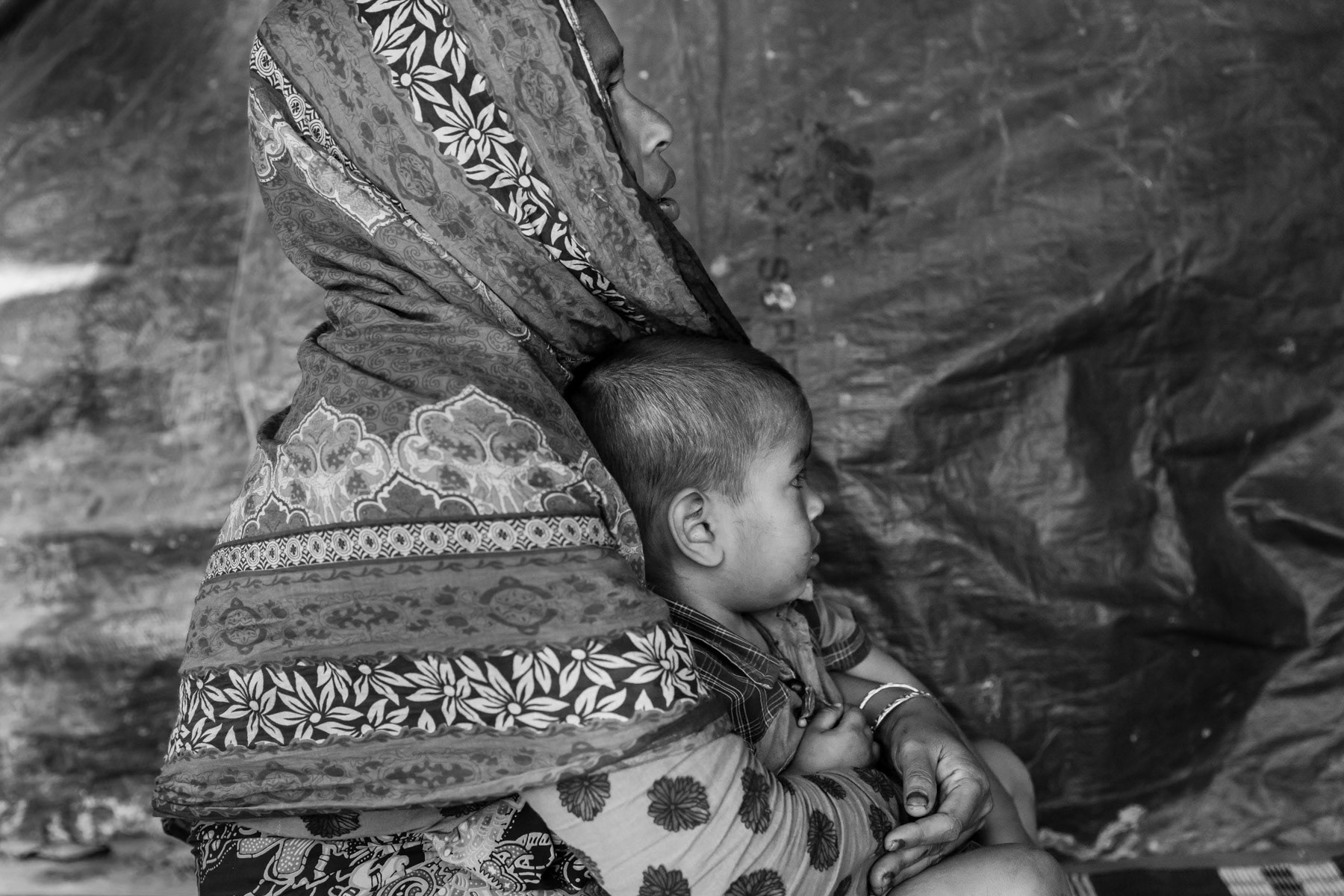
Rape victim, Sufia Khatun and her son from Chut Pyin, Rathedaung. She has 3 daughters, one daughter of 14 was gang raped and killed in front of her in the same room where she was raped, by military and local Rakhine which she can identify by name. She has 5 sons that were saved along with 2 of her younger daughters. Her husband was decapitated in front of them. She was gang-raped for a couple of hours by military and local mobs. The main local Rakhine rapists and killers were identified by her by their voice as she was blindfolded and tight while being raped and beaten. She was let go after giving all her gold jewellery and the equivalent of 500 usd in local currency. Two of her brothers and her sister in law were also massacred. Chut Pyin village is one of the numerous Rohingya villages that have been totally wiped out and where severe acts of ethnic cleansing with genocidal intend have been committed by the military and local mobs. Hundreds of Rohingya have been massacred in this village alone. Tangkhali camp, Bangladesh, March 2018
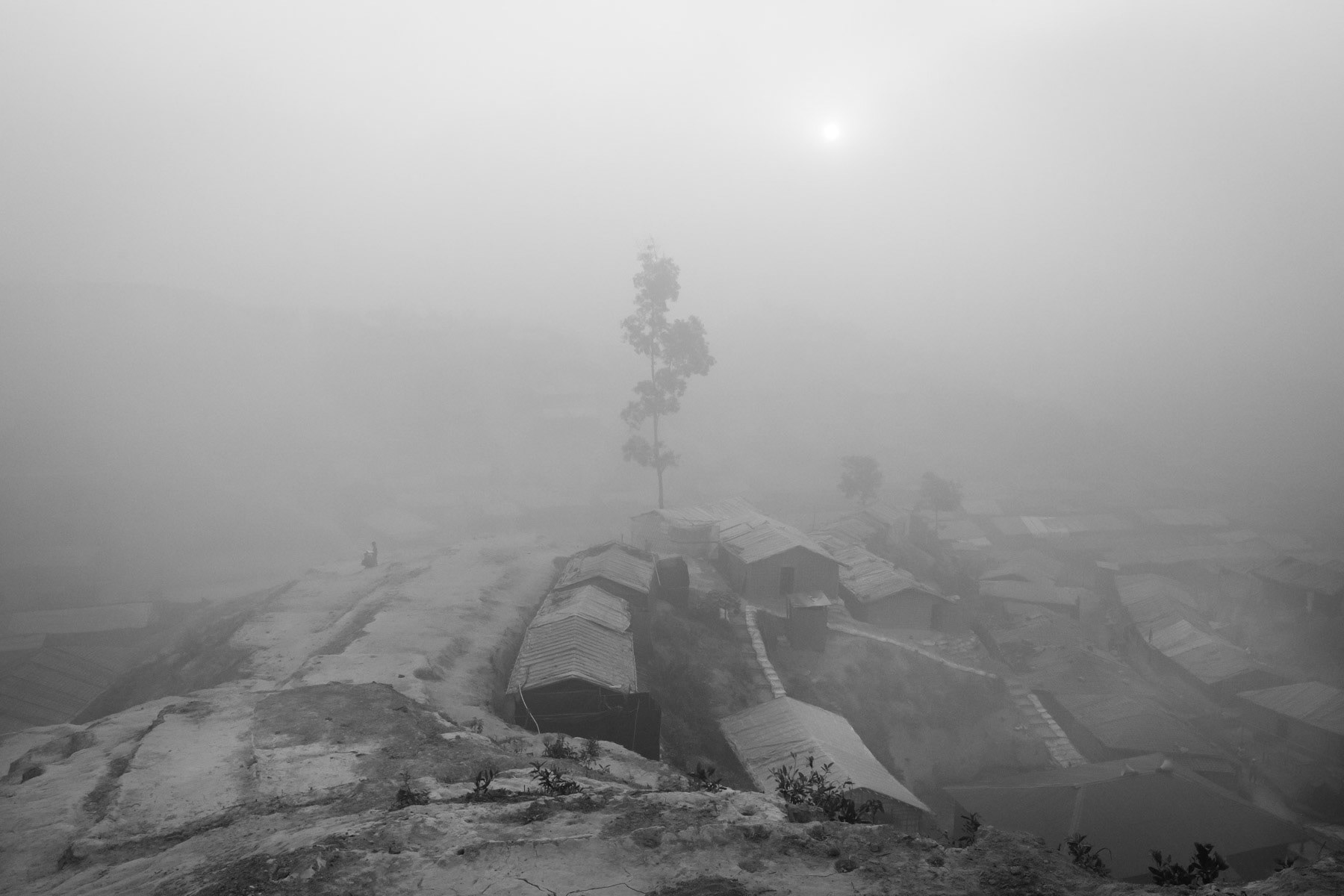
Early morning at the newly established refugee camp for Rohingya refugees. Balukhali camp near Ukhiya, Bangladesh, March 2018

Wounded child, Arofa Bibi, 10 years from Chut Pyin near Rathedaung in Rakhine. Her father was killed and burned by the military, her 15 year old brother dissapeared. She fled to Bangladesh with her mother, her wounded sister and 18 years old brother. Arofa was shot delibiratly in the leg. The wound got badly infected during the 7 day escape to Bangladesh. She was treated in Chittagong hospital for 18 days and was then transferred to the MSF clinic near the camps. Fortunately her leg was not amputated, she still has to check in the clinic every 2 days and needs crutches to walk. Chut Pyin village is one of the numerous Rohingya villages that have been totally wiped out and where severe acts of ethnic cleansing with genocidal intend have been committed by the military and local mobs. Hundreds of Rohingya have been massacred in this village alone. Tangkhali camp, Bangladesh, March 2018
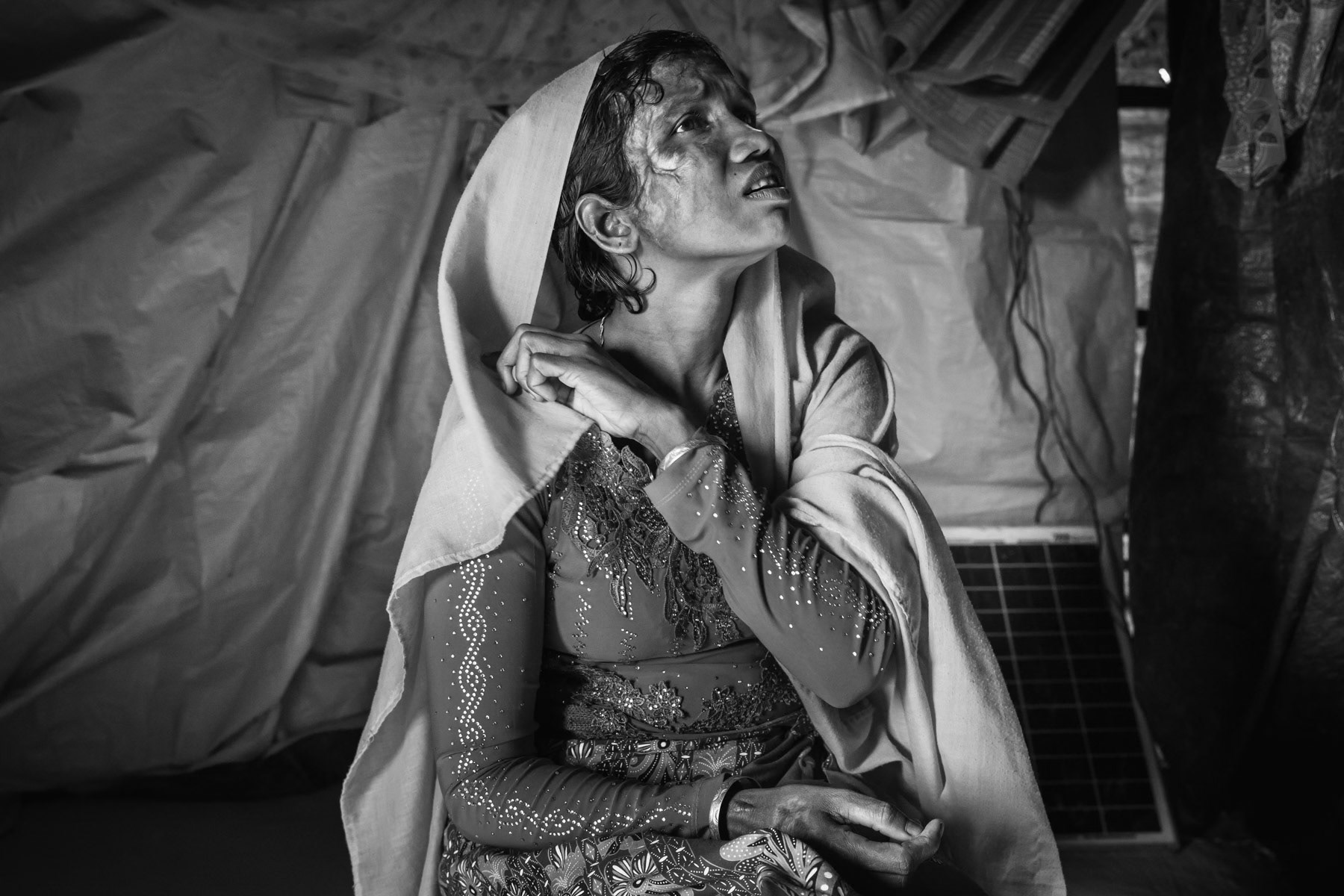
Momtaj Begum, 30 years old and her sole surviving child, Ruziya, 7 years old from Tula Tuli village in Maungdaw township. Tula Tuli village was attacked by Myanmar military forces on 30 August 2017 and survivors have witnessed extreme atrocities committed by military forces that international human rights groups have called brutal ethnic cleansing with possible genocidal intent. Momtaj Begum had 3 of her four children and husband executed and decapitated in front of her. She was consequently raped in front of her sole surviving daughter who was assaulted with a machette and left for dead. After the rape and the killings the house was locked by the military and set a blaze. She managed to escape with her daughther who had severe head wounds through the back door, while the military stayed in front of the burning houses. Doing so she was severely burned on more than 80% of her body, her daughter has several machette wounds on her skull. They arrived 5 days later in Bangladesh where she stayed one month in the MSF hospital. Her husband and 3 other boy children of 9,11 and 12 years were all burned in the house after being killed. Since our last meeting in November, they continue to struggle and to suffer as a result of the wounds and trauma. Going to the clinic to get care is challanging as it take 1$ for the trip and queues of more than one day. Also to collect the food rations she has to send her daughter as she has difficulties to walk. Her only surviving daughter has further head aches as a result of the machette wounds to her skull. Balukhali refugee camp in Bangladesh, March 2018
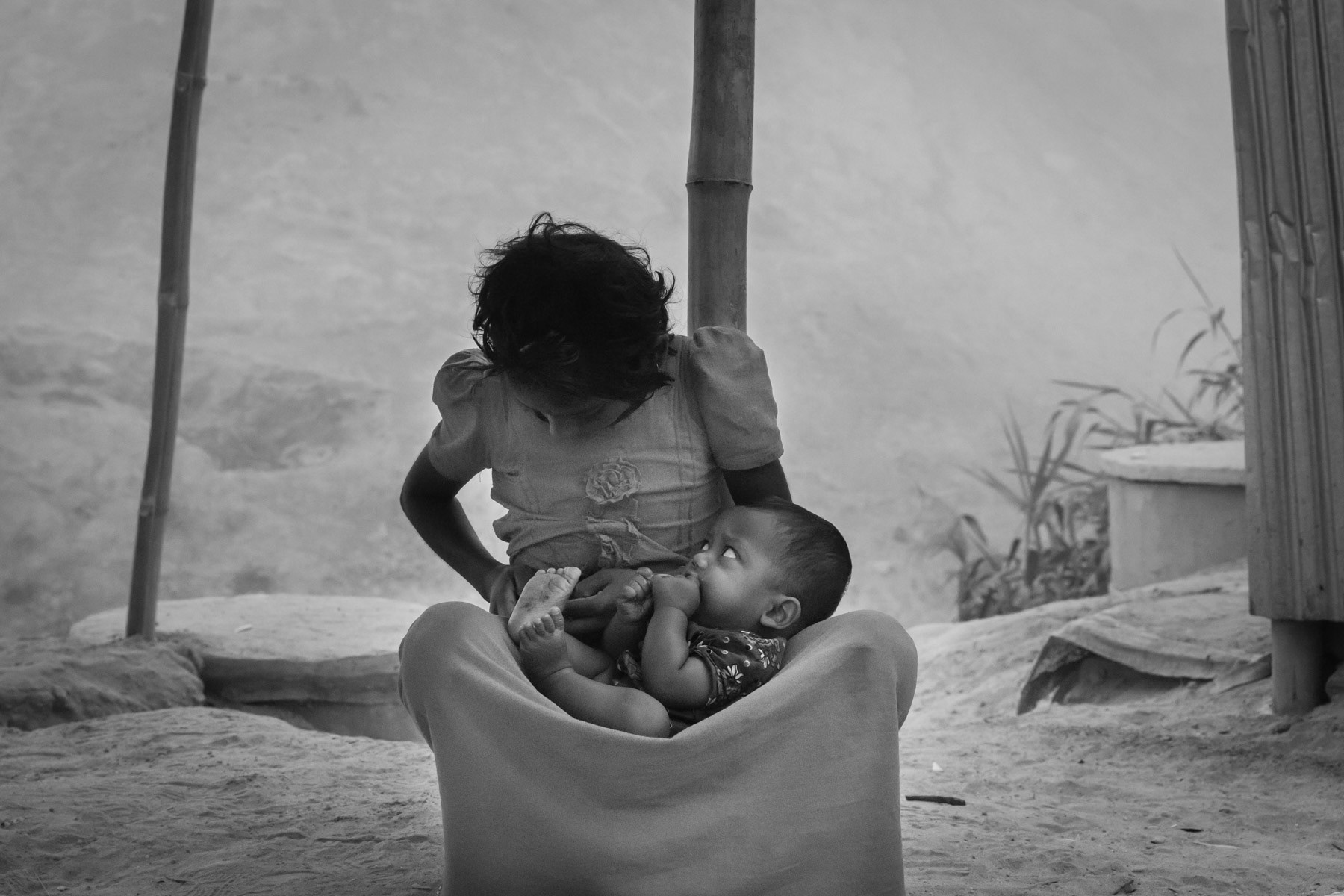
A Rohingya girl with her little brother that recently arrived from Myanmar. Rohingya have fled Myanmar since August and the start of the latest military security operations that are now widely qualified as ethnic cleansing campaigns. Balukhali camp, Ukhiya, Bangladesh, March 2018
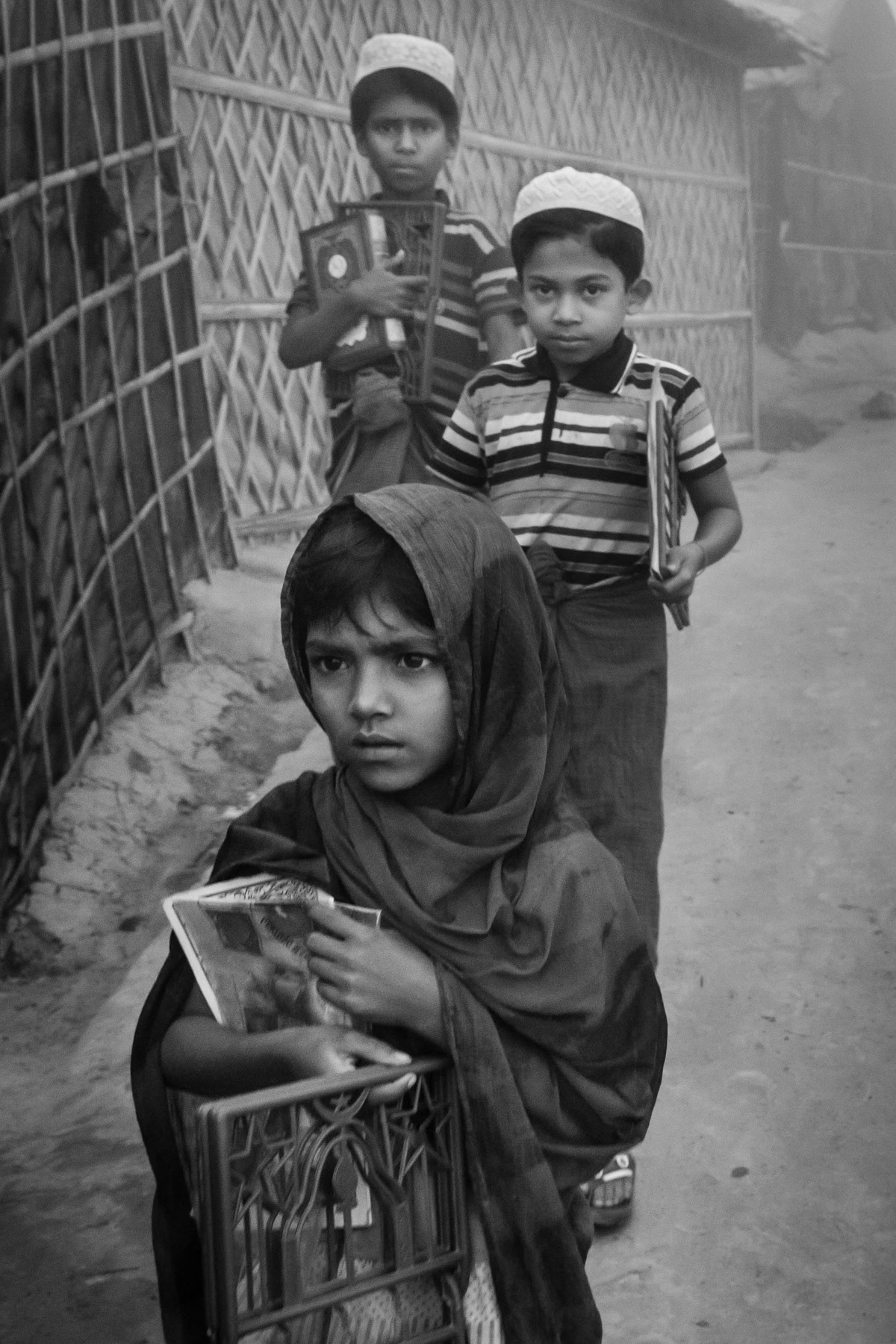
Rohingya children on the way to the medressa during the early morning hours. Thangkhali refugee camp, Ukhiya, Bangladesh, March 2018
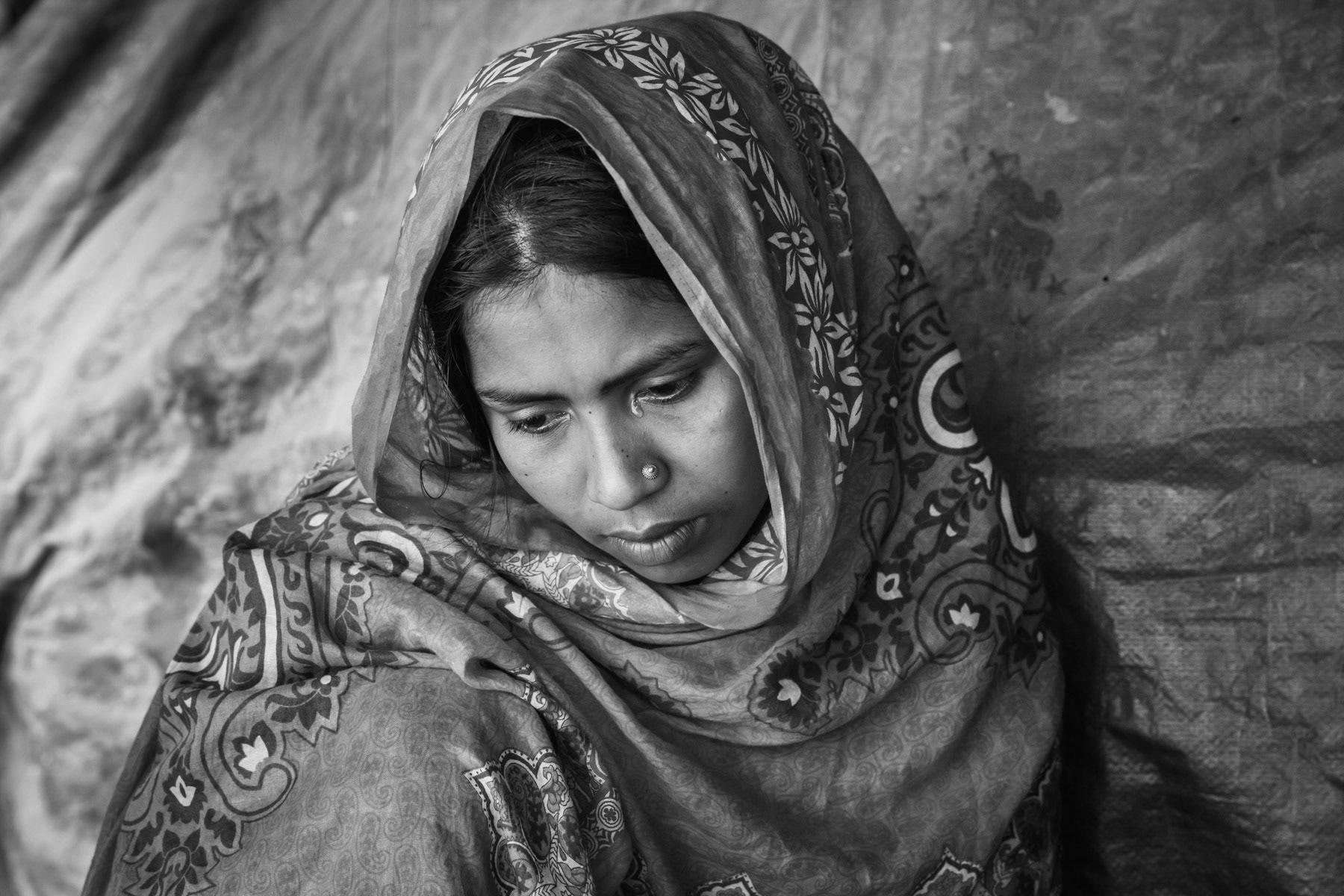
Hasina Begum, 20 years, from Chut Pyin, Rathedaung. Her husband was killed by Myanmar military during the attack on the village. She has one son and one daughter and fled with them and her parents to Bangladesh. Days before the attack they were forbidden to leave to buy food in the market and were basically under a 24 hours curfew within the village. The curfew was implemented by local Rakhine mobs, they didnt expect though what would follow. During the attack on the village about 120 villagers were collected and men and women were separated in the fields. More than 100 military were present. About 50 women were abducted and taken away to be raped. Their husbands were executed on the spot. Her baby who was with her, was taken away and given to her mother. All women (about 50) were taken to the local school building. Before being raped they were stripped searched for money and gold. While being raped they were putting heavy logs on their bodies so they wouldnt move. They were gang raped for 2 days. More than 100 military and locals were present in the school, maybe more groups passed during the 2 days. most of the time the women would be semi consicious. During the second night around 2AM, 5 of them including Hasina decided to try escaping through a back door. They were barely dressed and disorientated. Eventually they found their surviving families hiding in the jungle surrounding their village. The next early morning they all fled to Bangladesh where she now lives with her parents, one brother and 2 children. Chut Pyin village is one of the numerous Rohingya villages that have been totally wiped out and where severe acts of ethnic cleansing with genocidal intend have been committed by the military and local mobs. Hundreds of Rohingya have been massacred in this village alone. Tangkhali camp, Bangladesh, March 2018
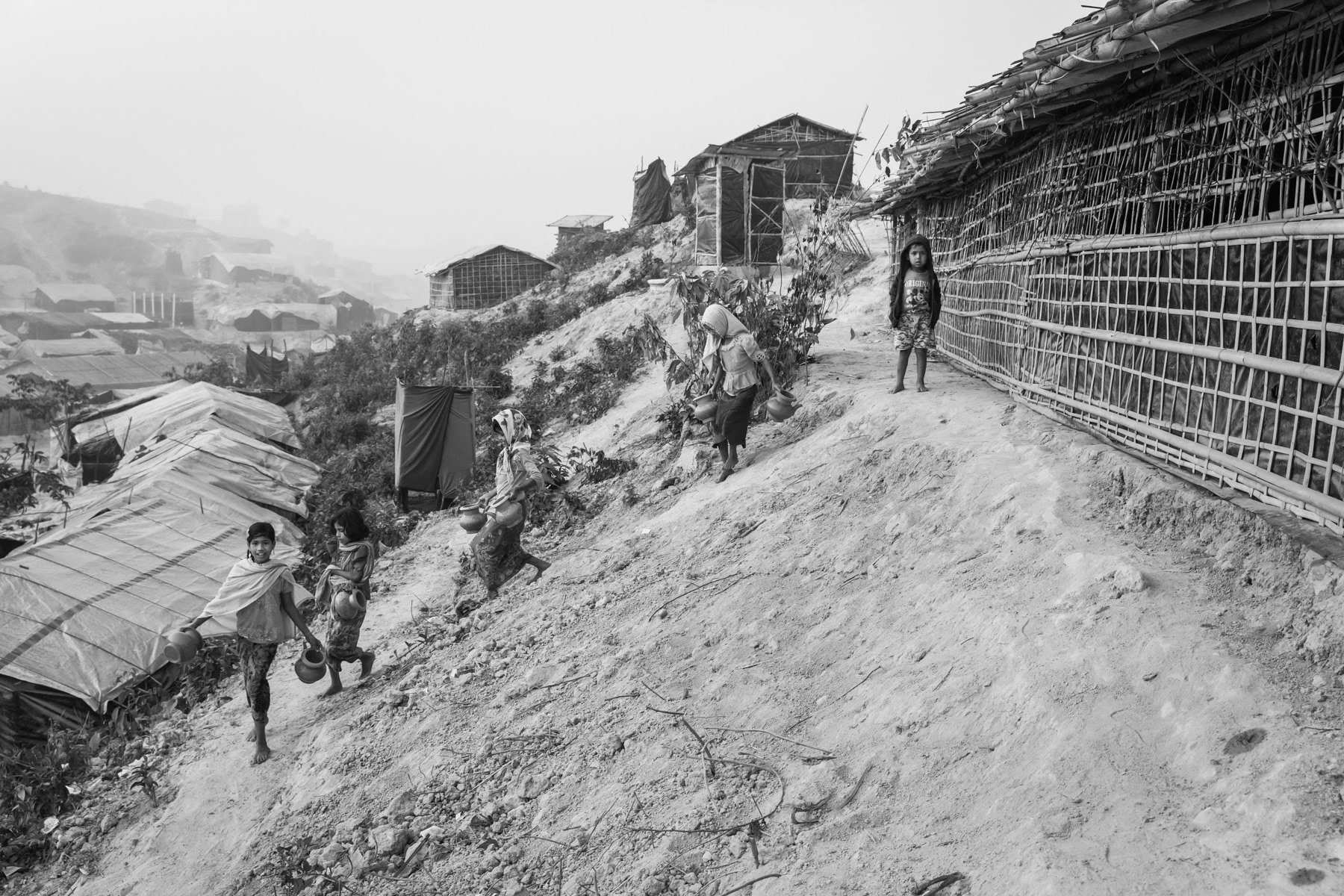
Rohingya children going to collect water from one of the few tube wells in the refugee camp for new arrivals. More than 650,000 Rohingya refugees have arrived in Bangladesh since August 2017. Thangkhali refugee camp, Ukhiya, Bangladesh, March 2018
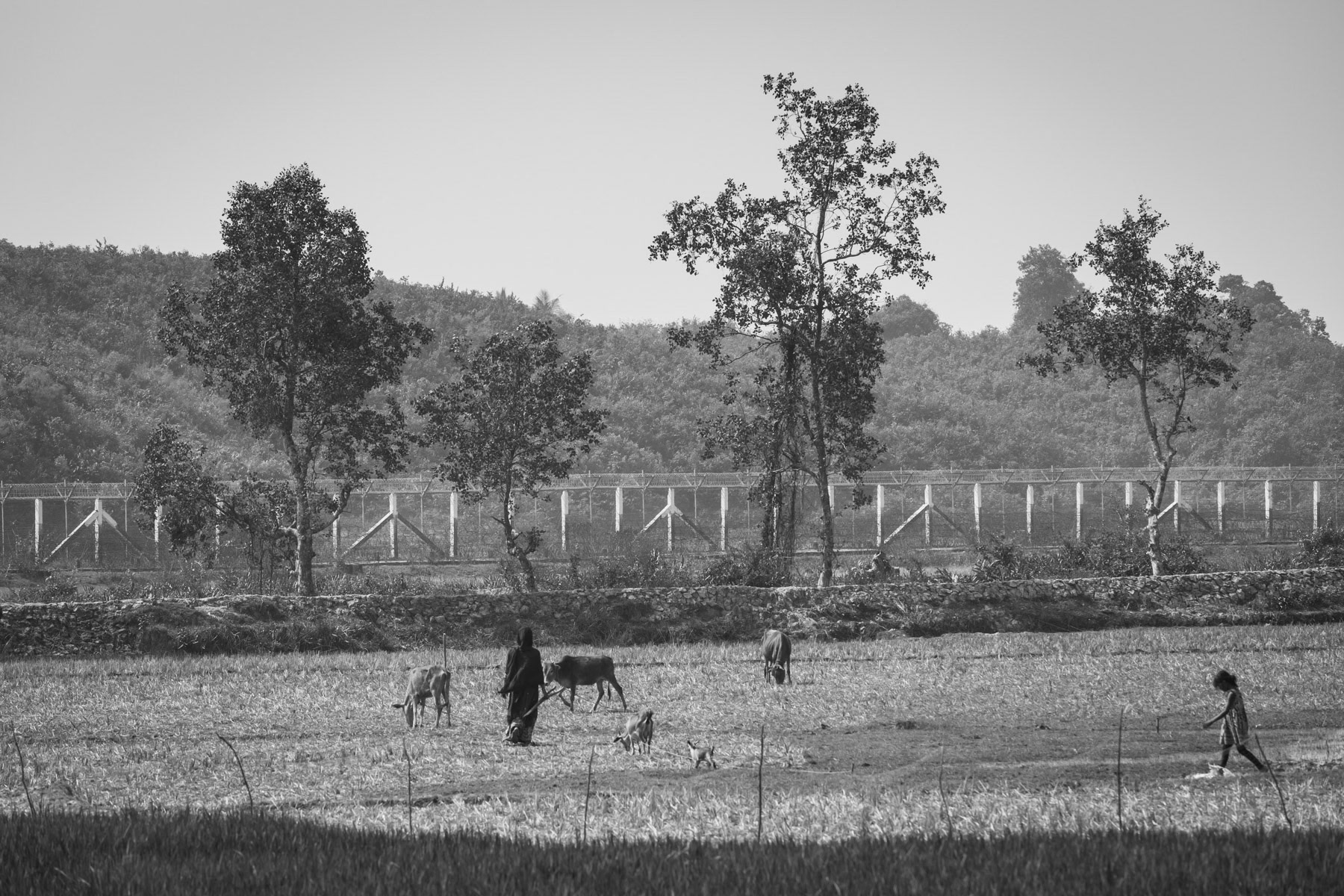
The Myanmar-Bangladesh border fenced off on the Myanmar side. Certain parts of the border have also been mined to avoid Rohingya to flee or return from and to their homeland. Border near point zero, Ukhiya, Bangladeshi side of the border, March 2018
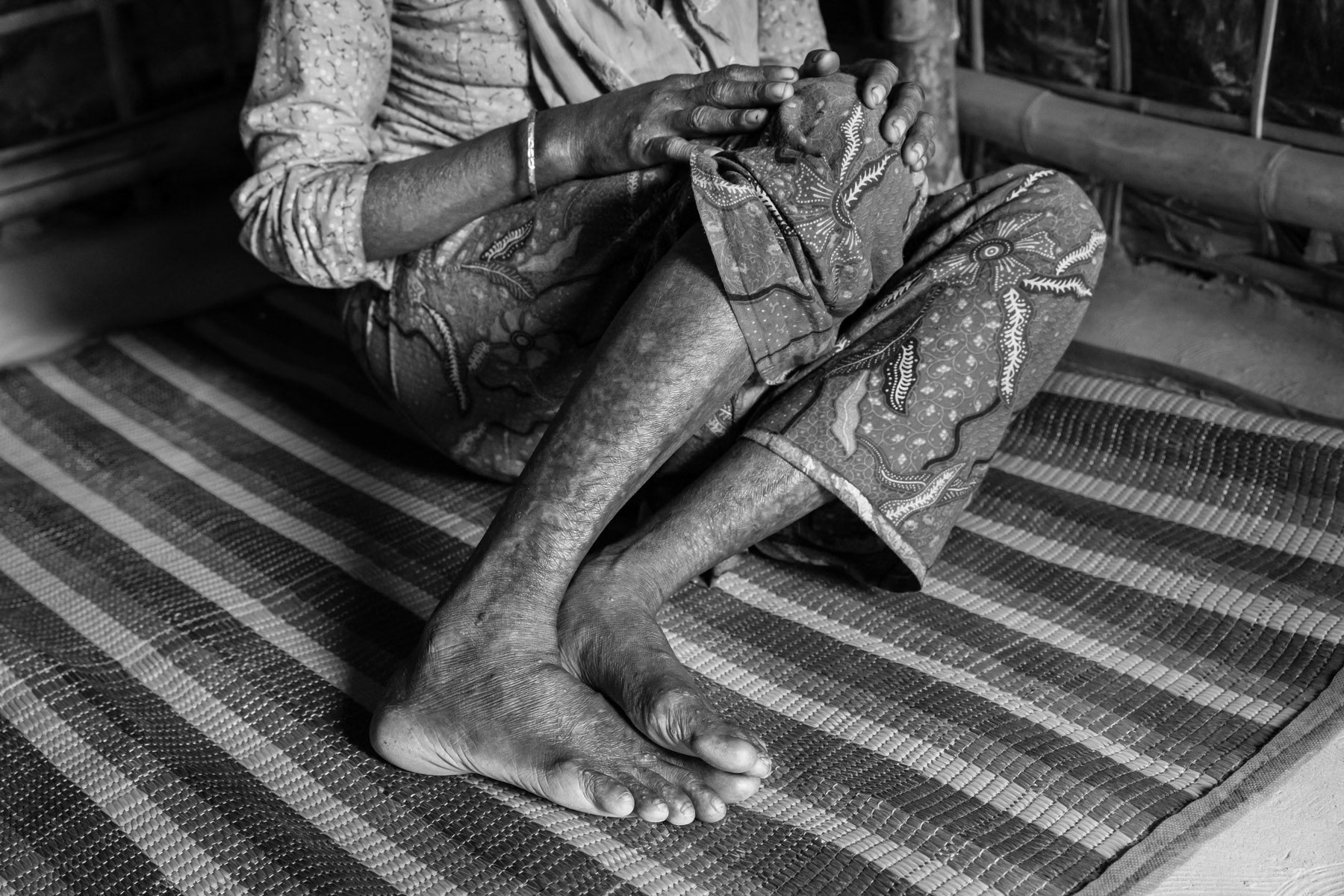
Shaju Begun, 40 years, from Chut Pyin near Rathedaung in Myanmar. Her husband, 2 daughters and 2 sons were killed when their village was attacked. While going inside the burning house to safe her younger children she got burned all over her body. She escaped from the fire and collapsed in the paddy fields where two of her surviving younger children found her. They fled to Bangladesh after that. Chut Pyin village is one of the numerous Rohingya villages that have been totally wiped out and where severe acts of ethnic cleansing with genocidal intend have been committed by the military and local mobs. Hundreds of Rohingya have been massacred in this village alone. Tangkhali camp, Bangladesh, March 2018
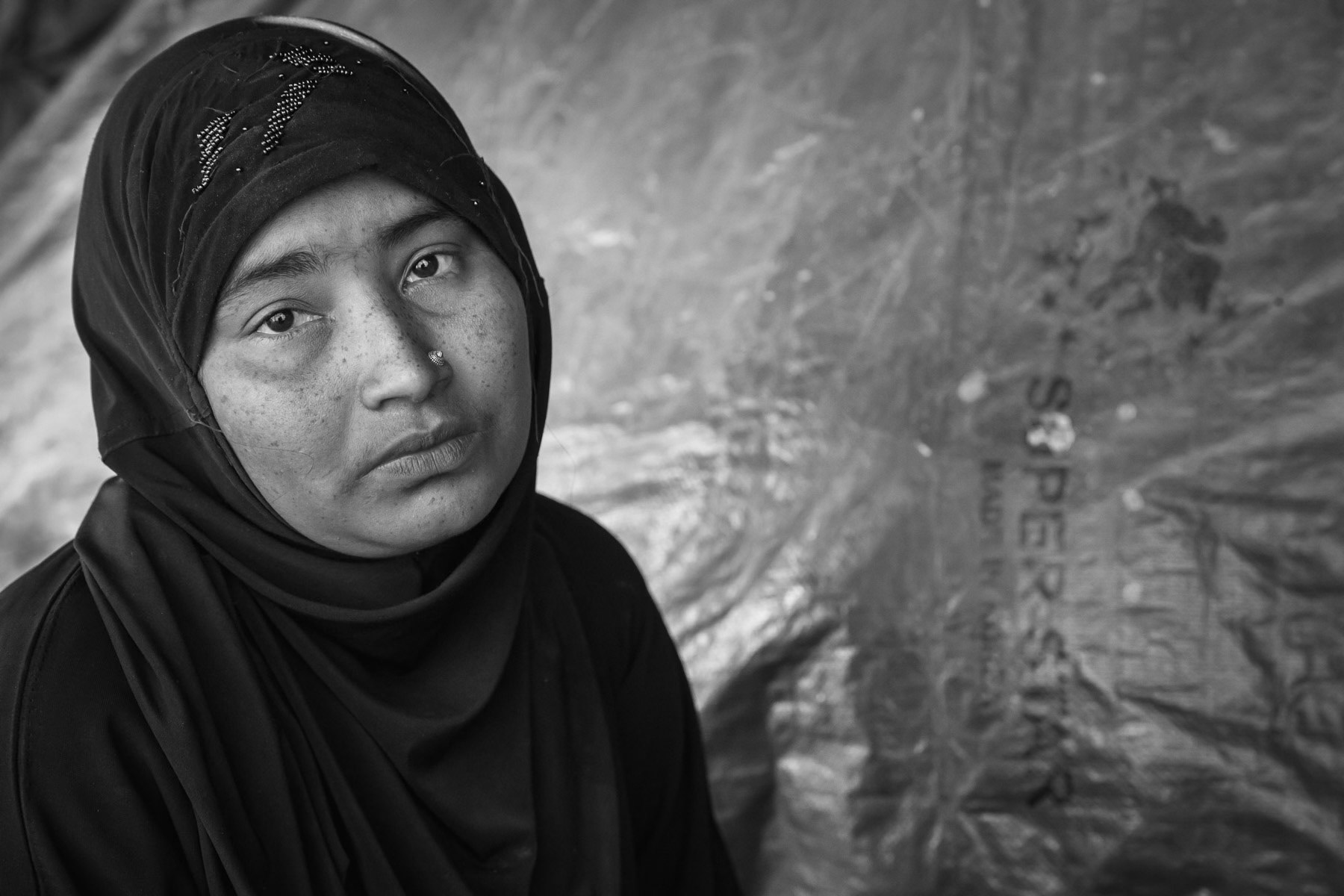
Mosafa, 25 years, from Chut Pyin near Rathedaung. She is one of the numerous rape victims. Her husband was killed by decapitation in front of her. She has four young daughters of 3, 5, 8, and10 years. She was gang-raped for 3 hours by military and local Rakhine residents. After being raped she was left for dead and finally escaped with her children that were left unharmed. She came to Bangadesh by foot with her children and other villagers. Chut Pyin village is one of the numerous Rohingya villages that have been totally wiped out and where severe acts of ethnic cleansing with genocidal intend have been committed by the military and local mobs. Hundreds of Rohingya have been massacred in this village alone. Tangkhali camp, Bangladesh, March 2018
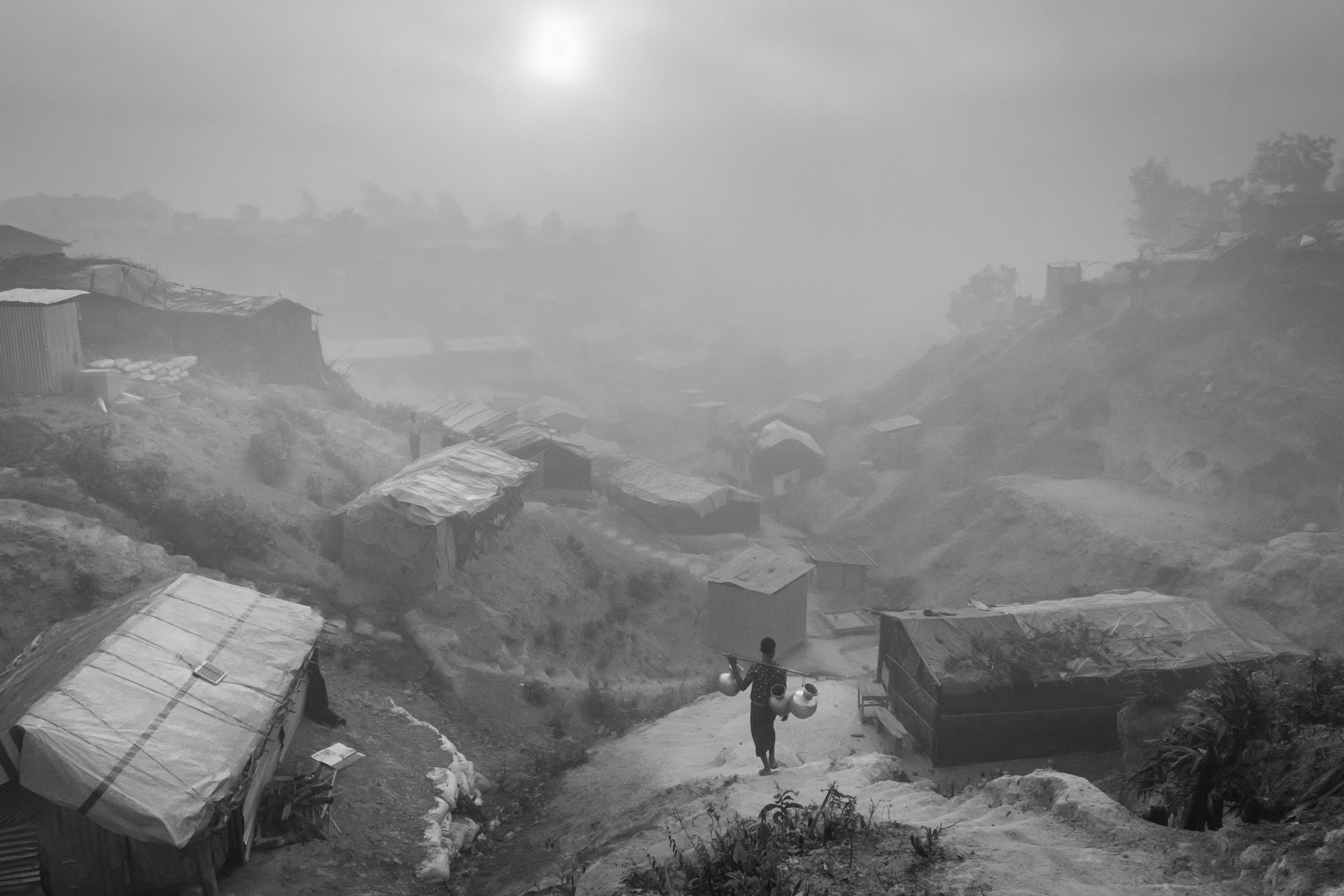
A Rohingya refugee carrying water from one of the few tube wells in the refugee camp for new arrivals. More than 650,000 Rohingya refugees have arrived in Bangladesh since August 2017. Thangkhali refugee camp, Bangladesh, March 2018
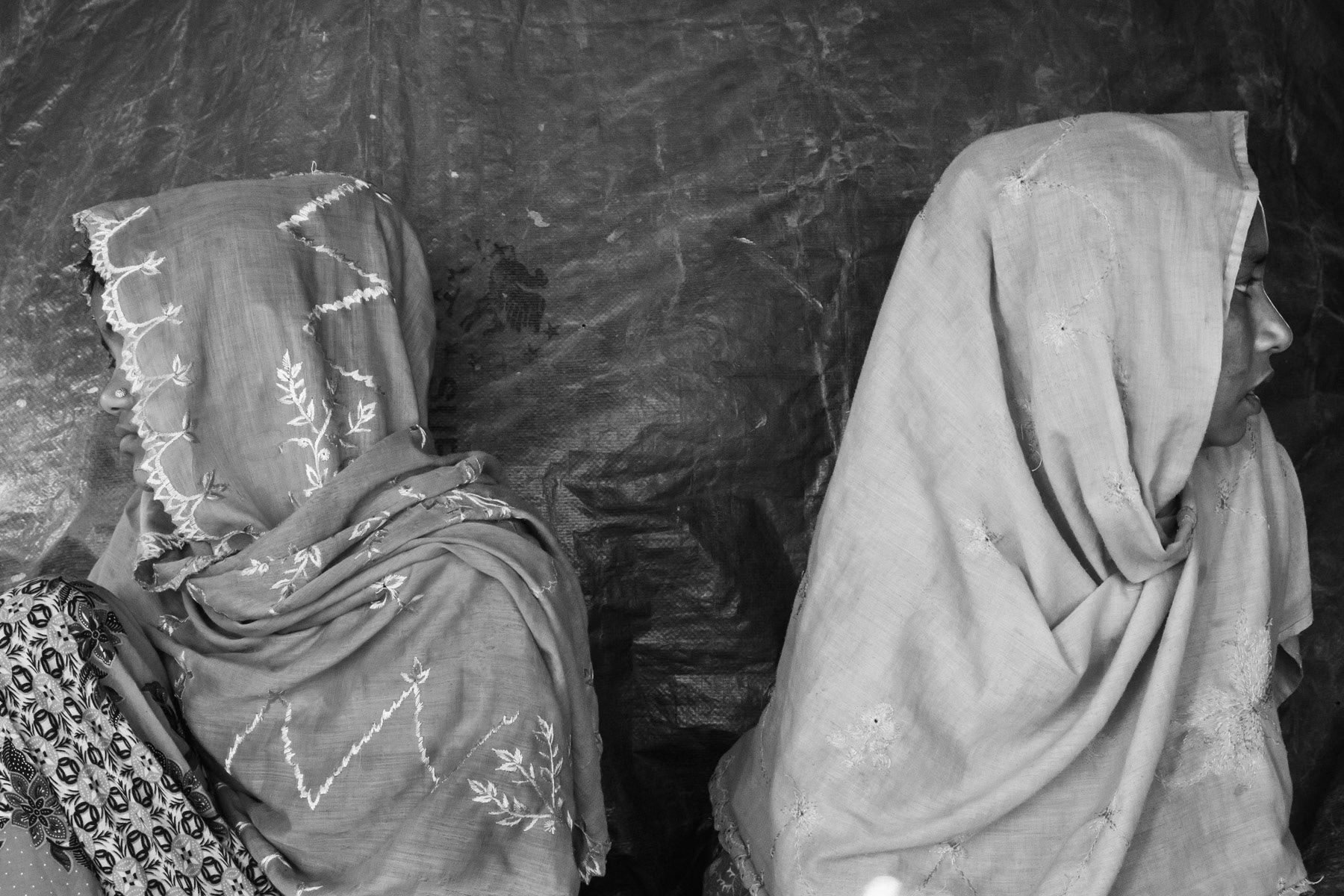
Sufayra Begun (left) and Fatima Khatun (right), respectively 20 and 28 years, from Chut Pyin, Rathedaung. Survivors of the Chut Pyin massacre and victims of extreme sexual violence. Chut Pyin village is one of the numerous Rohingya villages that have been totally wiped out and where severe acts of ethnic cleansing with genocidal intend have been committed by the military and local Rakhine mobs. Hundreds of Rohingya have been massacred and dozens of women have been gang-raped in this village alone. Tangkhali camp, Bangladesh, March 2018
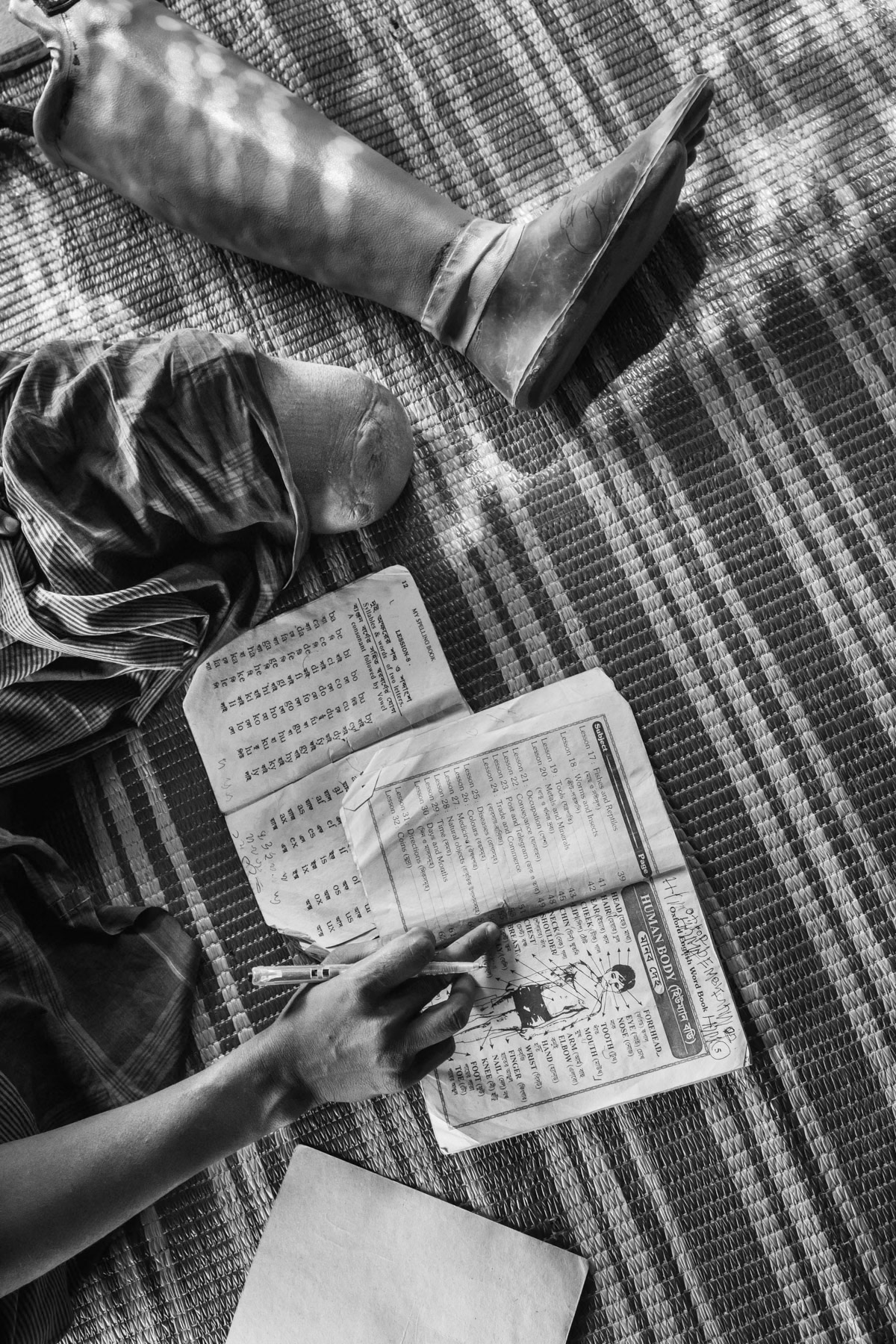
Abdul Karim,19y, Shautpara (same village), Rathedaung. He was shopkeeper with his father. Arrived in Sep in BD. Lost his leg, got a prothesis from a donor. Sister, father, brother were killed. Came to BD with one brother and mother. During the attack he was shot in the leg. It took them 7 days to reach BD. Got the first medical care once reaching BD, he was referred to Chittagong where they had to amputate his leg till under the knee as the untreated wound got badly infected. He learns now English to become business man.
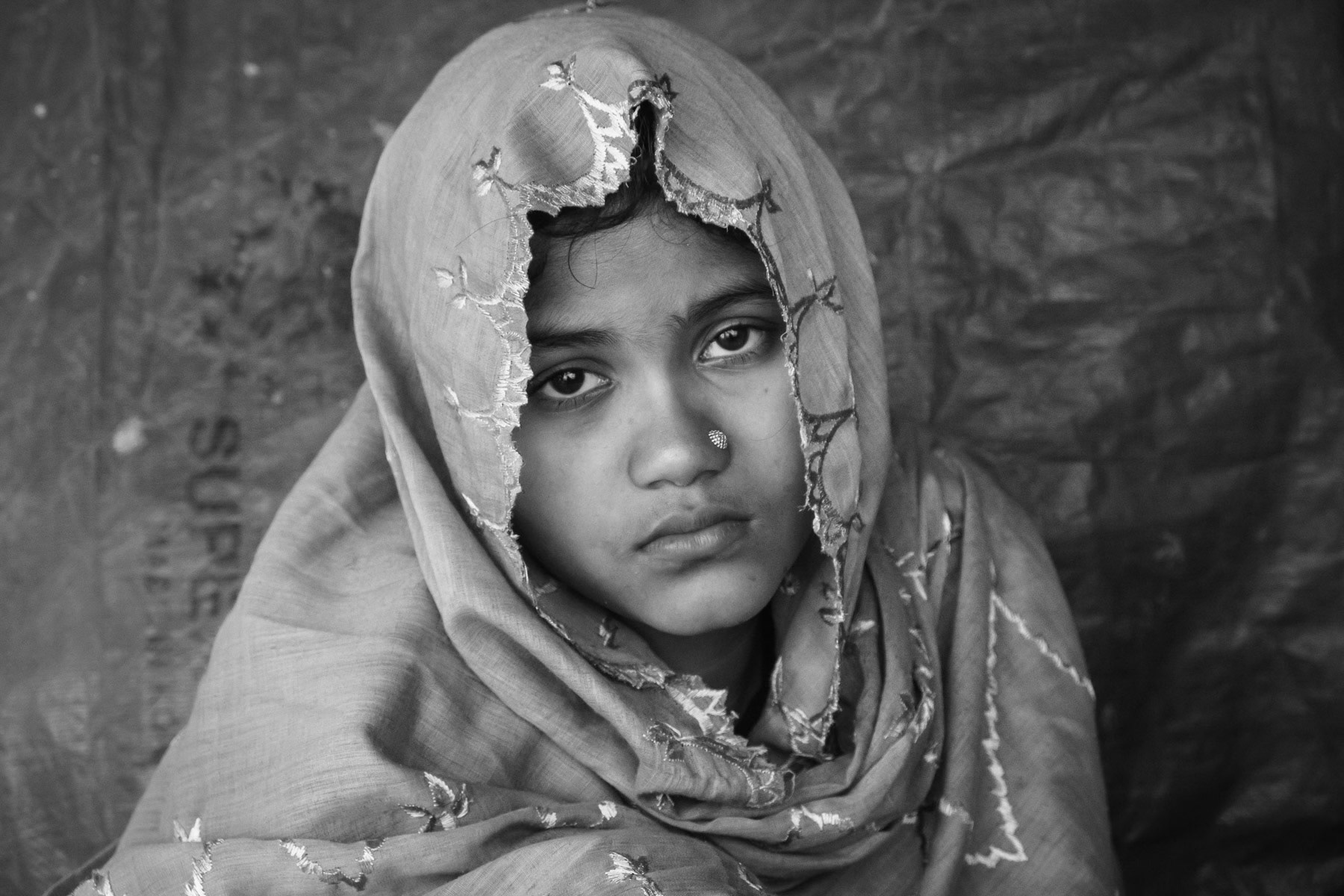
Sufayra Begun, 20 years, from Chut Pyin, Rathedaung. Got married one month before the attack in August 2017. Her husband was shot and killed, along with her father in law and brother by the military. Together with other women and girls she was taken blindfolded and tight to a shed where they would be gang-raped by the military and local rakhine mobs for several hours. Few of them were killed while being abused. Together with eight other women she managed to escape and returned near the village to find family that had survived the massacres. Although she was blindfolded she has recognized the voices of the non-military rapists, all were local Rakhine from the same village. It took her nearly a week to reach Bangladesh in September 2017. She now lives alone with her 4 year old sister, her mother lives in another block of the camp. Chut Pyin village is one of the numerous Rohingya villages that have been totally wiped out and where severe acts of ethnic cleansing with genocidal intend have been committed by the military and local mobs. Hundreds of Rohingya have been massacred in this village alone. Tangkhali camp, Bangladesh, March 2018
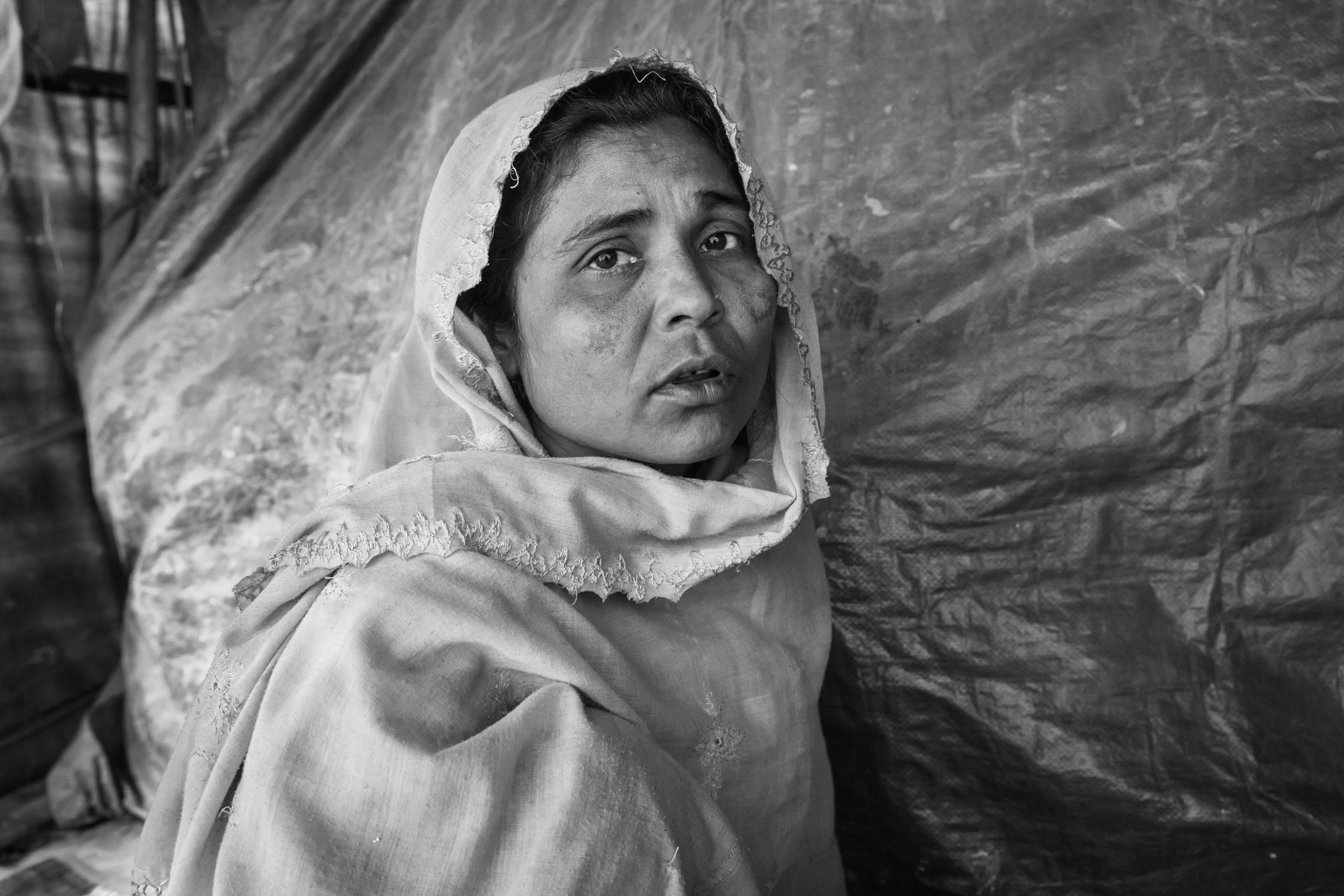
Nur Begum, 38 years, from Chut Pyin near Rathedaung in Myanmar. She is one of the numerous rape victims. Her 20 year old son and husband were killed. Her 17 year old daughter was gang-raped and killed. Twenty military attacked their house together with the local Rakhine leaders. She was raped by the local militia, her daughter was raped and killed in another room. Her surviving children were hiding near the house in the forest. She found her daughter dead after the rapists and military had left their house. The killings and rape took place in her house. Chut Pyin village is one of the numerous Rohingya villages that have been totally wiped out and where severe acts of ethnic cleansing with genocidal intend have been committed by the military and local mobs. Hundreds of Rohingya have been massacred in this village alone. Tangkhali camp, Bangladesh, March 2018
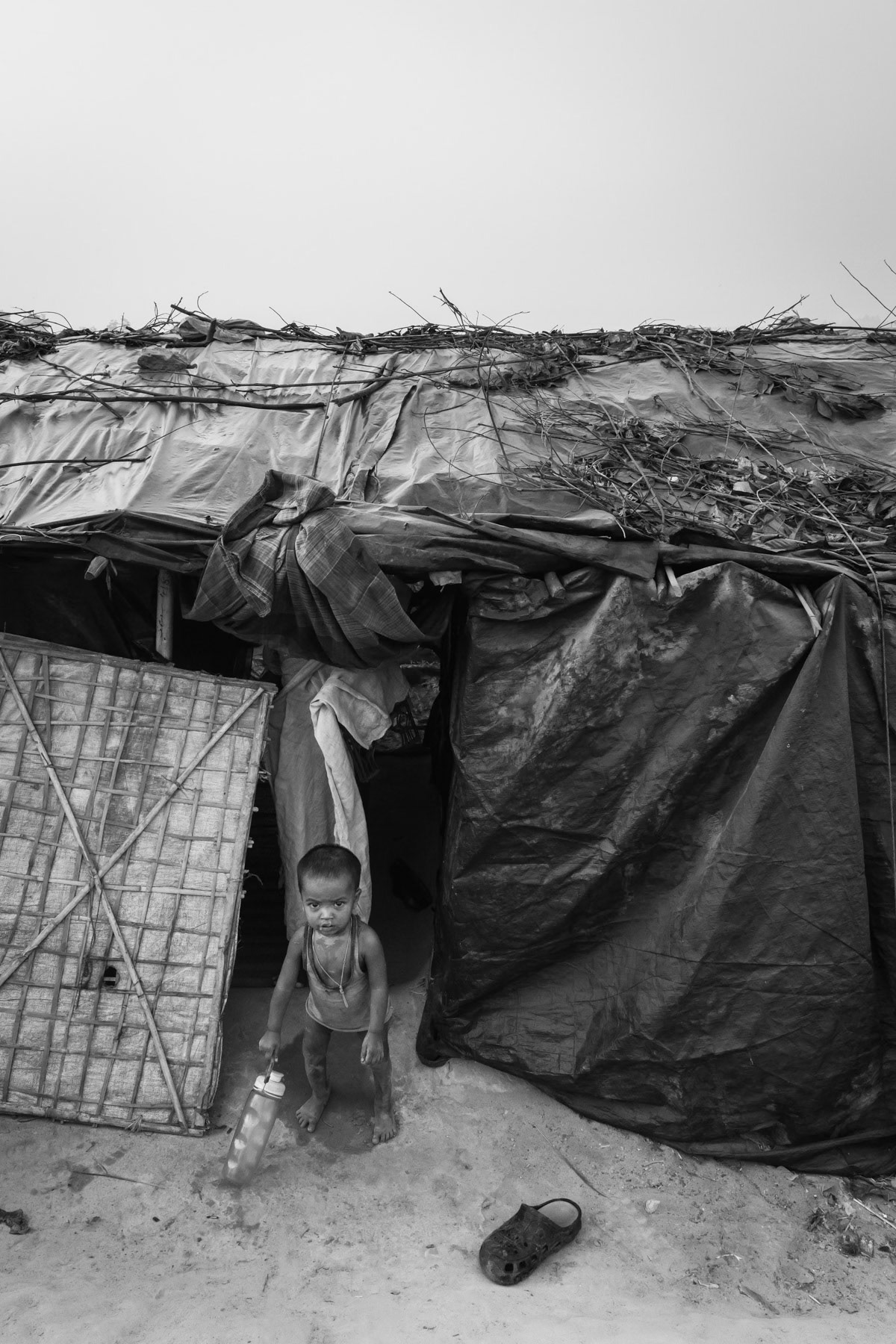
A Rohingya child that has recently arrived from Myanmar. The Rohingya have fled Myanmar since August and the start of the latest military security operations that are now widely qualified as ethnic cleansing campaigns. Thangkhali refugee camp, Ukhiya, Bangladesh, March 2018
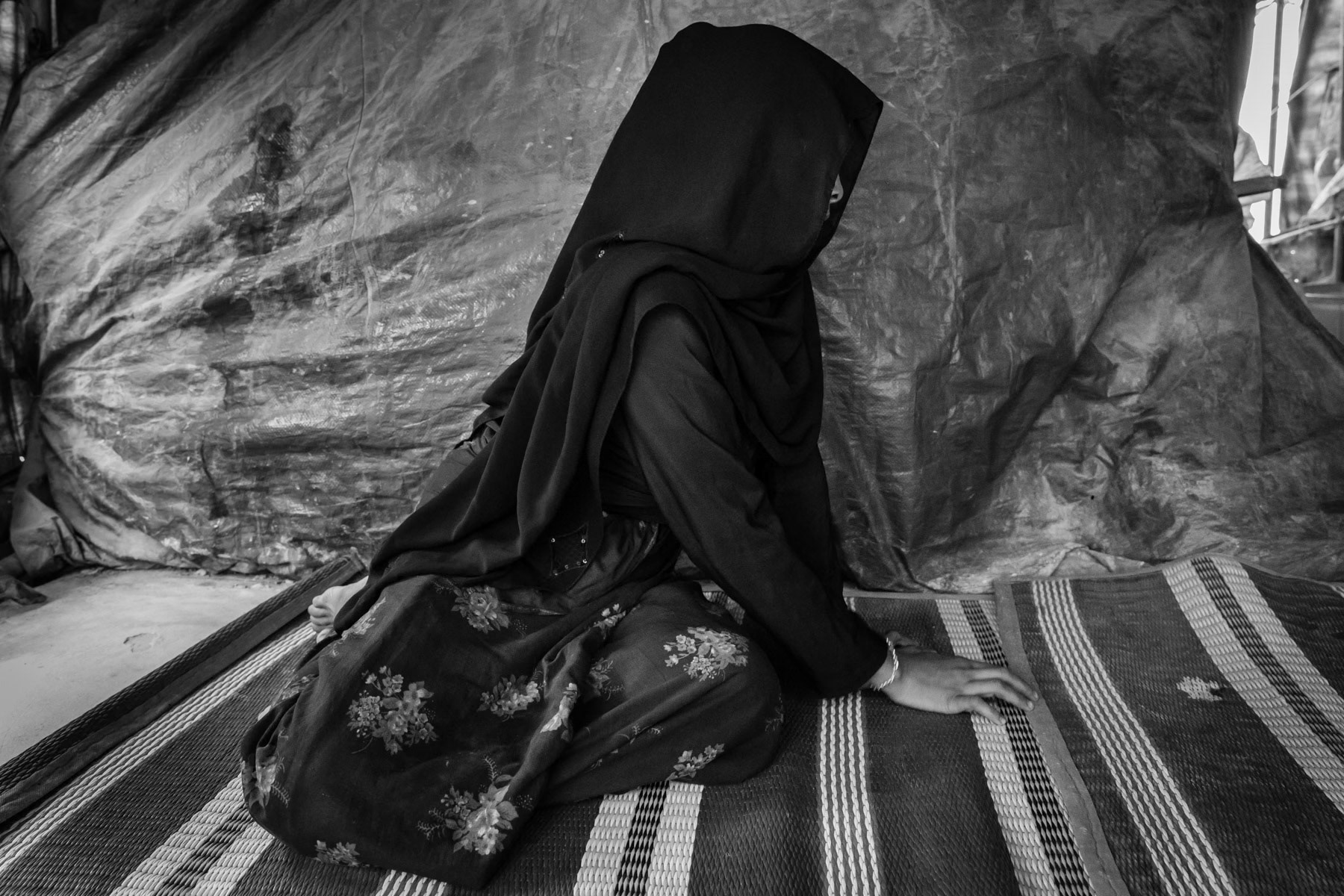
Nur Begum, 25 years from Chut Pyin, Rathedaung. Arrived in September 2017 in Bangladesh. Her husband was killed when their village was attacked end August 2017. She is a victim of torture and rape. She fled to Bangladesh with her 3 sons and daughter, it took them 7 days to reach the Bangladeshi borde. Her father was also killed, being a lone mother she survives on the rations refugees are receiving. She is a refugee for the second time after having fled with her patents in the nineties when she was a young child. She now fled herself with her four children. As she says "I has never known a moment of hapiness in my life since I was born" She was gang-raped by military and local rakhine mobs with 4 other women from the village. While they were assaulted and raped raped their assailants cut off a breast of one of the women. They were taken in a remote place in the hills where they were raped continously by 10-12 people for 5-6 hours. Off the five women all were killed except her. She thinks she was not killed because she was with her 6 month old baby. The other women were decapitated. When she returned to the village to find her family she witnessed between 400 and 500 dead bodies of Rohingya villagers. Among them she saw her brother and sister in law and her father. Chut Pyin village is one of the numerous Rohingya villages that have been totally wiped out and where severe acts of ethnic cleansing with genocidal intend have been committed by the military and local mobs. Hundreds of Rohingya have been massacred in this village alone. Tangkhali camp, Bangladesh, March 2018

A new extension to the already overcrowded refugee camps to shelter part of the 650,000 newly arrived Rohingya refugees. The Rohingya refugee camps are now sheltering Rohingya victims of the 1978, 1992, 2008, 2012, 2016 and 2017 ethnic cleansing campaigns. By begining 2018 more than one million Rohingya refugees live in tha camps near Cox's Bazar making it the largest refugee camps in the world. Balukhali section, Ukhiya, Bangladesh, March 2018
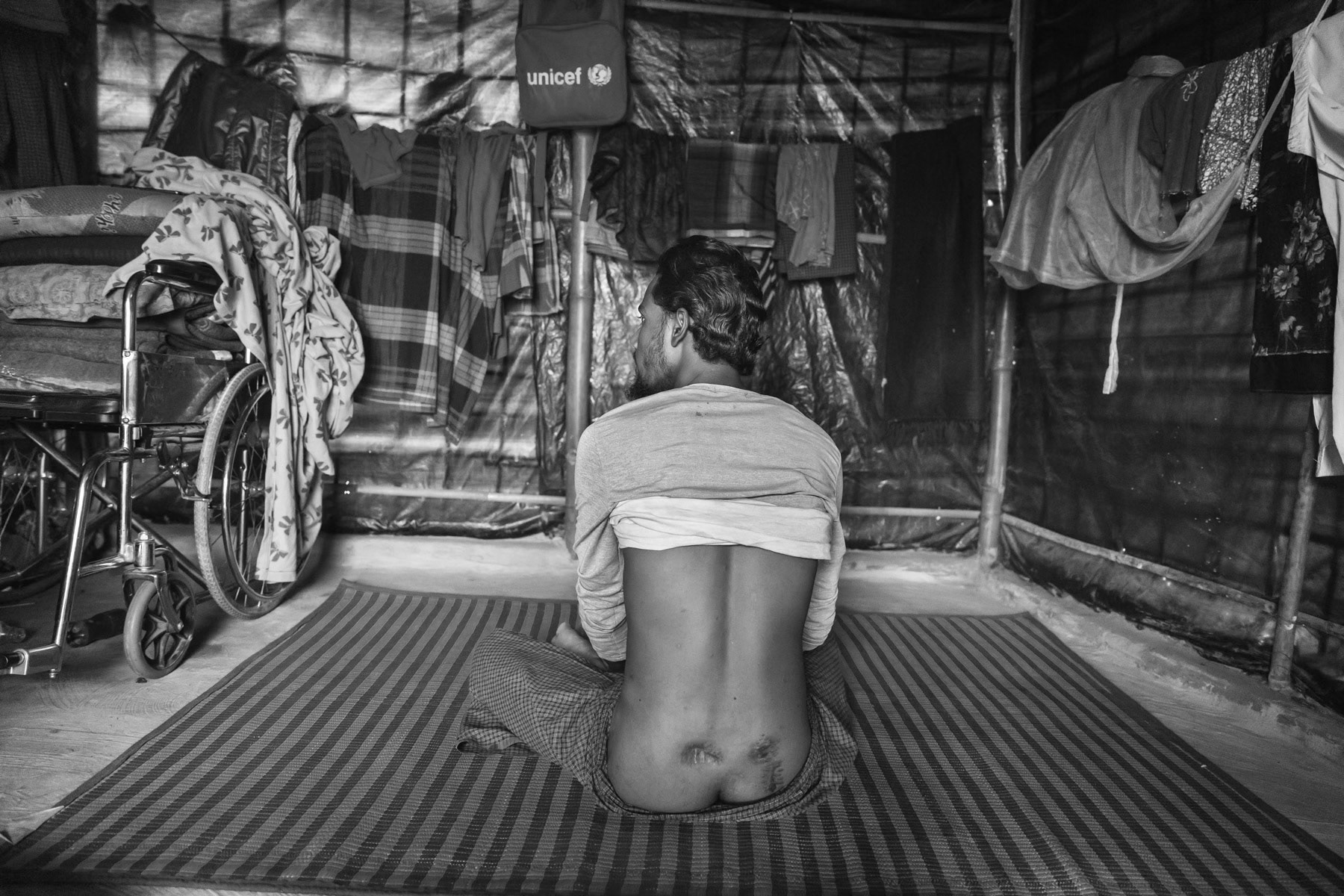
Abdullah, 27 years, arrived in October 2017 from Kulun, Maungdaw. Was shot twice in the back while escaping, fell in the ditch where he was rescued by his brother and friends and carried 4 days before reaching safety in Bangladesh. His mother, wife and both children made it also safely to the other side of the border. Bullets were removed through abdominal surgery. He stayed 10 weeks in hospital. He can walk, but can't go up and downhill. He has received a wheelchair through charity, which is unfortunately useless in the refugee camps. Balukhali refugee camp, Bangladesh, March 2018
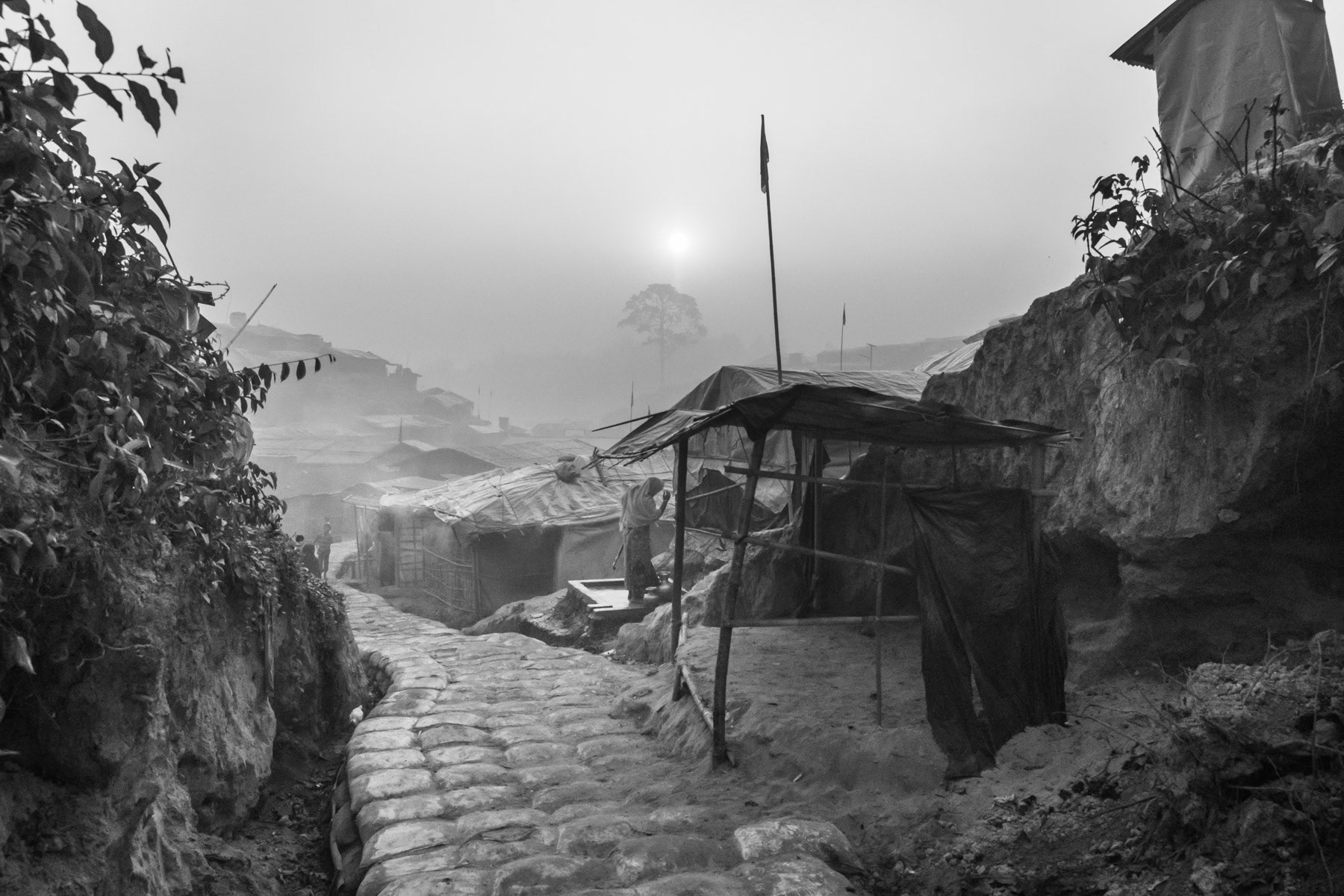
A new extension to the already overcrowded refugee camps to shelter part of the 650,000 newly arrived Rohingya refugees. The Rohingya refugee camps are now sheltering Rohingya victims of the 1978, 1992, 2008, 2012, 2016 and 2017 ethnic cleansing campaigns. By begining 2018 more than one million Rohingya refugees live in tha camps near Cox's Bazar making it the largest refugee camps in the world. Balukhali section, Ukhiya, Bangladesh, March 2018
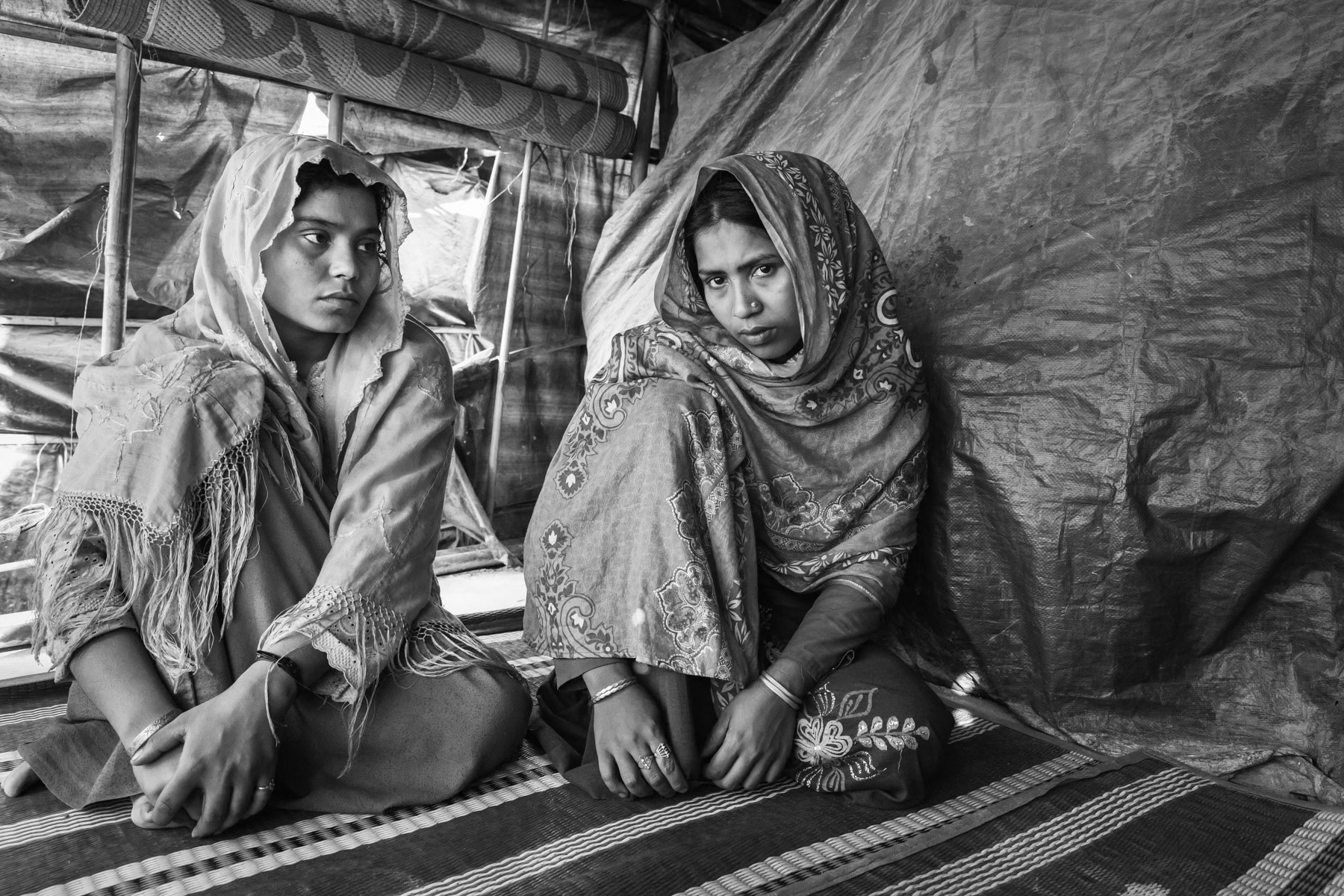
Hasina Begum (right) and Roiza Khatun (left), respectively 20 and 23 years, from Chut Pyin, Rathedaung. Survivors of the Chut Pyin massacre and victims of extreme sexual violence. Chut Pyin village is one of the numerous Rohingya villages that have been totally wiped out and where severe acts of ethnic cleansing with genocidal intend have been committed by the military and local Rakhine mobs. Hundreds of Rohingya have been massacred and dozens of women have been gang-raped in this village alone. Tangkhali camp, Bangladesh, March 2018
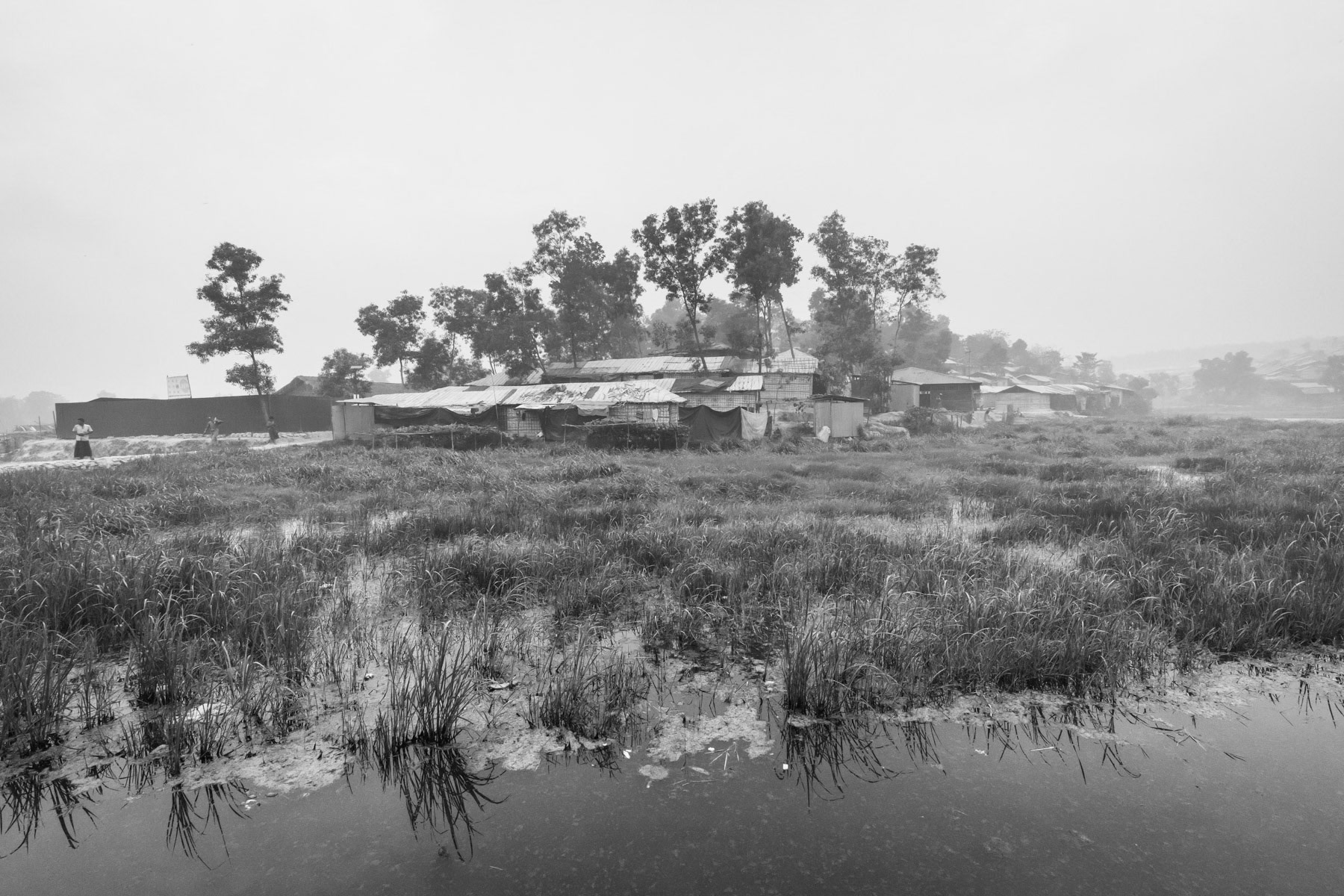
A plot allocated to build a new refugee camp extension for the more than 650,000 Rohingya refugees that have arrived during the past months from Myanmar. This huge influx has put an enourmeous strain on the local environment and economy resulting in substantial deforestation, pollution, price hikes and tensions with local communities. Lambashiya, a new section of Kutupalong refugee camp, Ukhiya, Bangladesh, March 2018
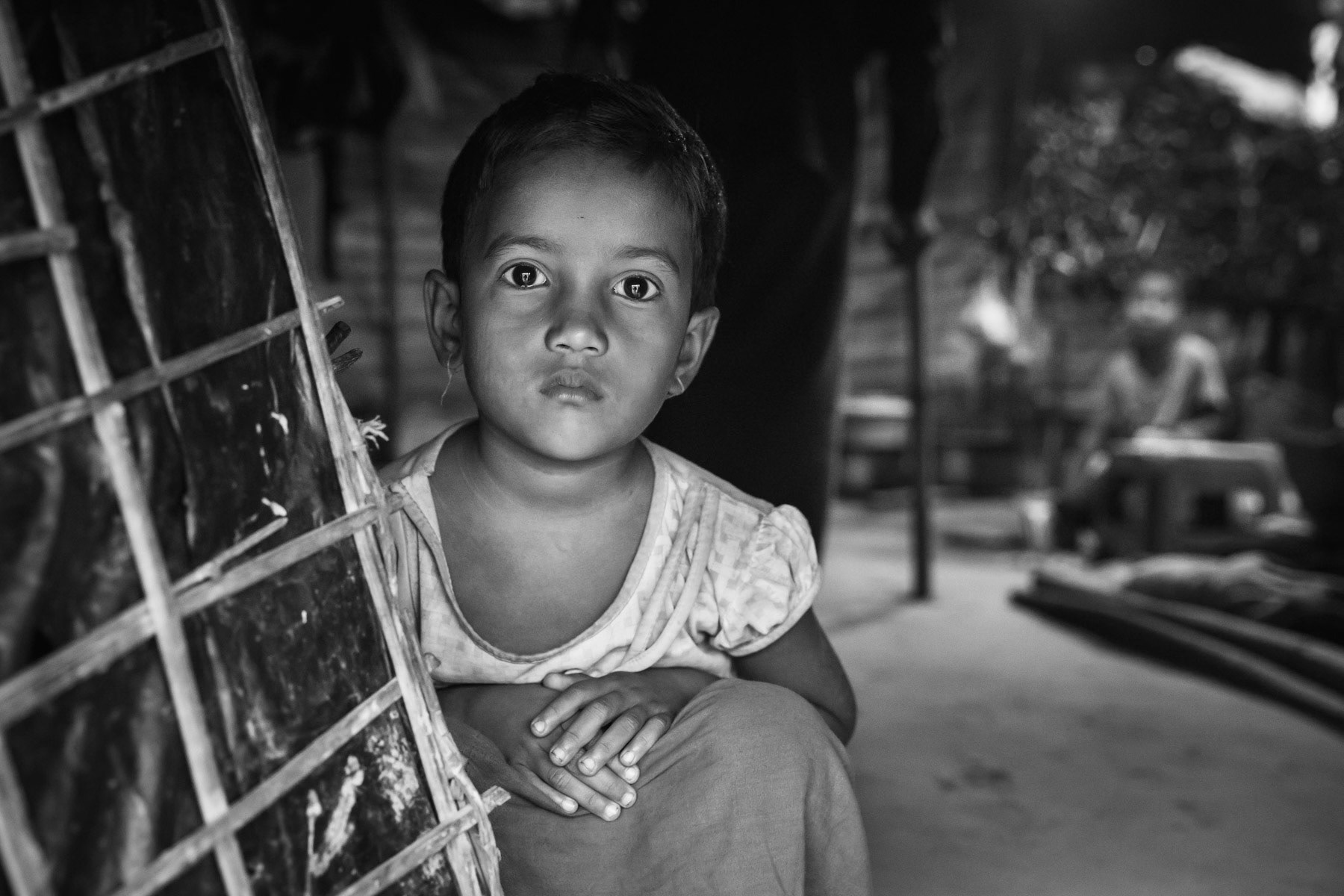
A Rohingya girl that recently arrived from Myanmar. Rohingya have fled Myanmar since August and the start of the latest military security operations that are now widely qualified as ethnic cleansing campaigns. Balukhali refugee camp, Ukhiya, Bangladesh, March 2018
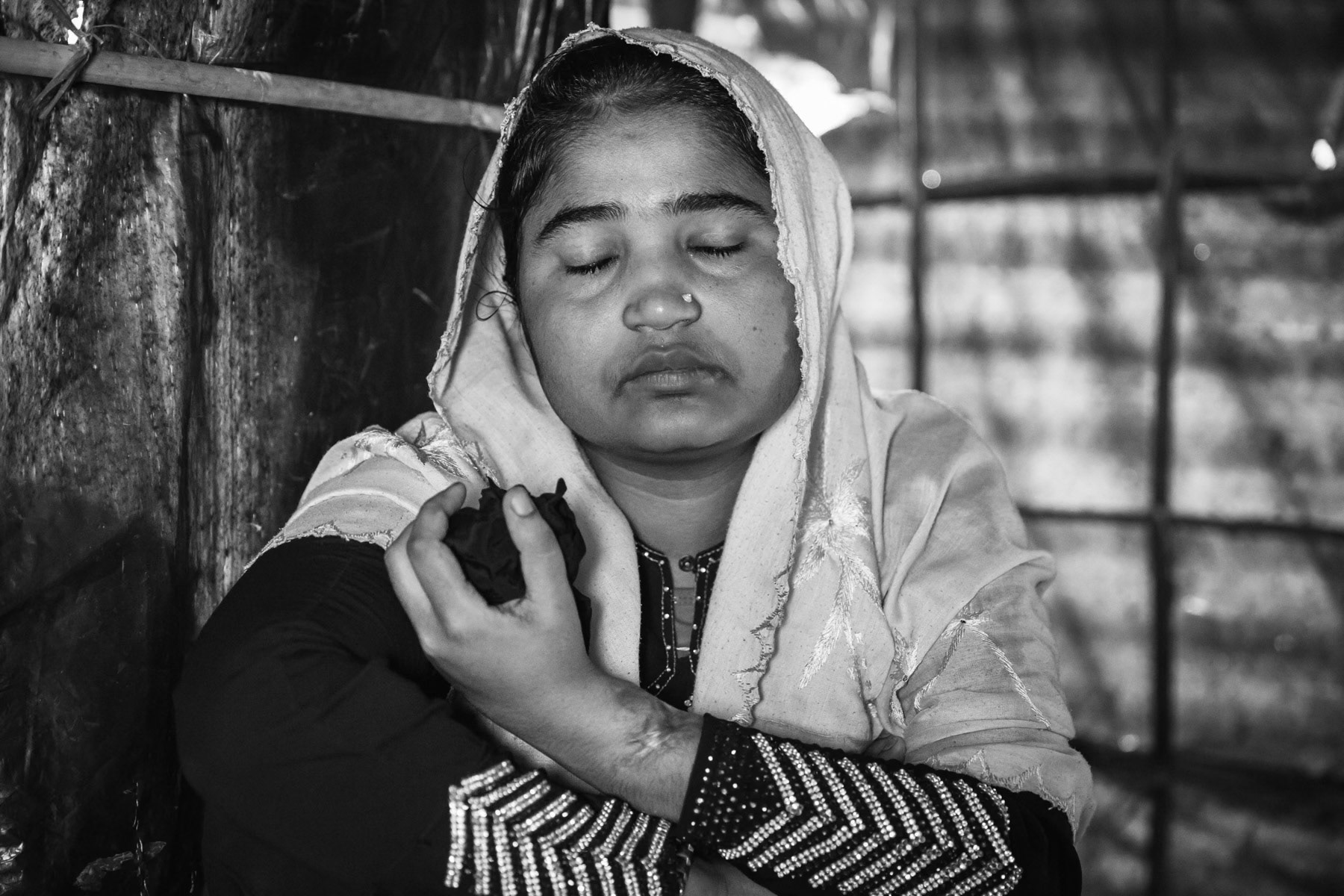
Korima Khatun, 20y, Shautpare (same village), Rathedaung. When the village was attacked and she fled with her baby of 8 month in her arms. She got shot in her wrist and the bullit killed her baby instantly. Her husband was killed during the attack. She took his dead body with her and burried him. She is in Bangladesh since September 2017. Thangkhali Refugee Camp, March 2018
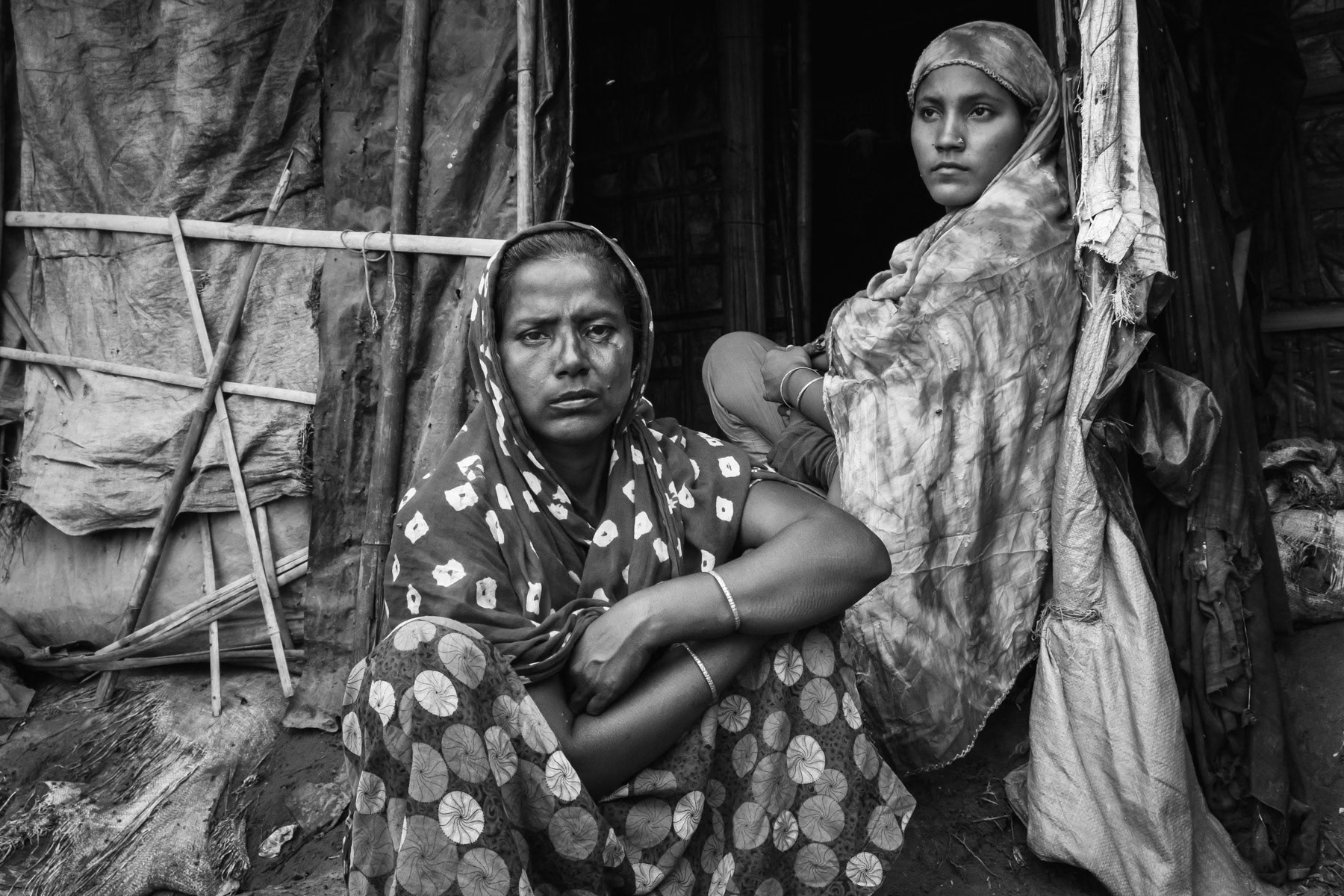
Victim of torture who has fled in 2016 from Myanmar after her husband has been taken away by the army. She has no news of her husband iever since. Najirar Tak, Cox's Bazar, Bangladesh, March 2018
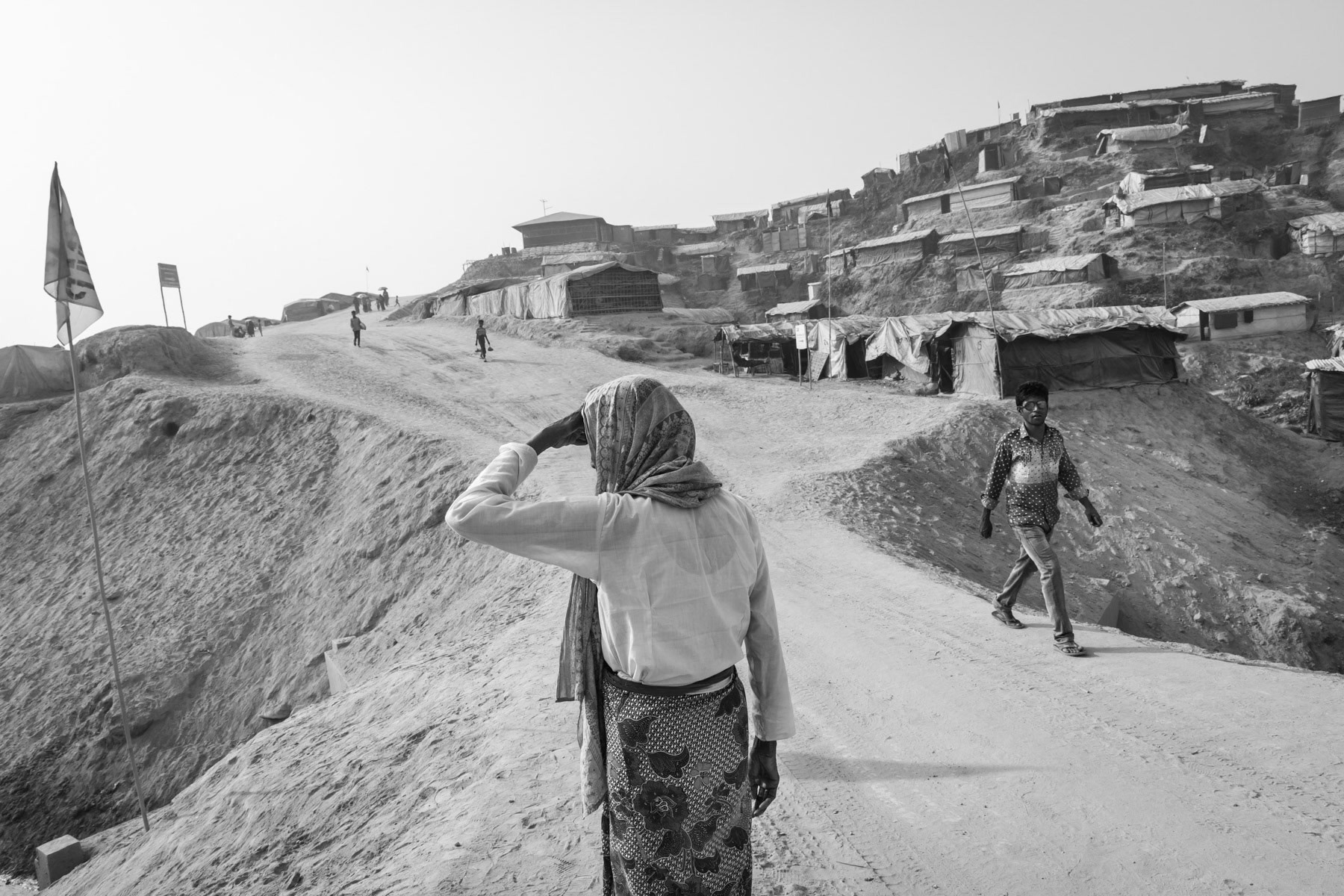
Elderly Rohingya woman that arrived recently in Bangladesh fleeing the ongoing ethnic cleansing campaigns in neighbouring Burma. Balukhali refugee camp, Ukhiya, Bangladesh, March 2018
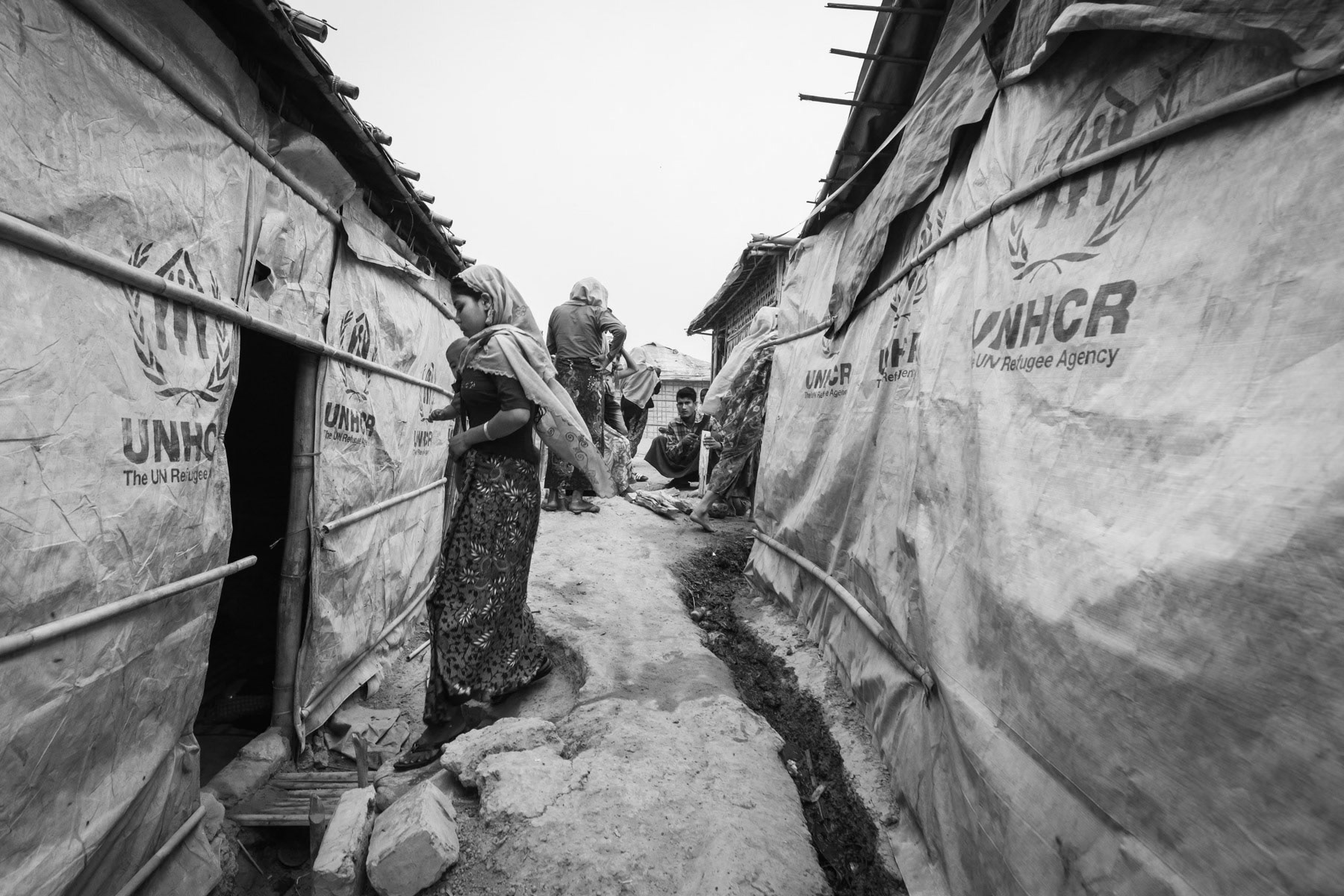
A new extension to the already overcrowded refugee camps to shelter part of the 650,000 newly arrived Rohingya refugees. The Rohingya refugee camps are now sheltering Rohingya victims of the 1978, 1992, 2008, 2012, 2016 and 2017 ethnic cleansing campaigns. By the begining of 2018 more than one million Rohingya refugees live in tha camps near Cox's Bazar making it the largest refugee camps in the world. Lambashiya, Kutupalong camp, Ukhiya, Bangladesh, March 2018

Md Shubeg, 11 years old from Maungdaw. Was shot in the abdominal area. The bullet was extracted in Bangladesh where he has been 3 months in hospital. Arrived 7 months ago with his family, 3 sisters, 2 brothers and both parents. All made it safely to Bangladesh. Kutupalong, Bangladesh, March 2018
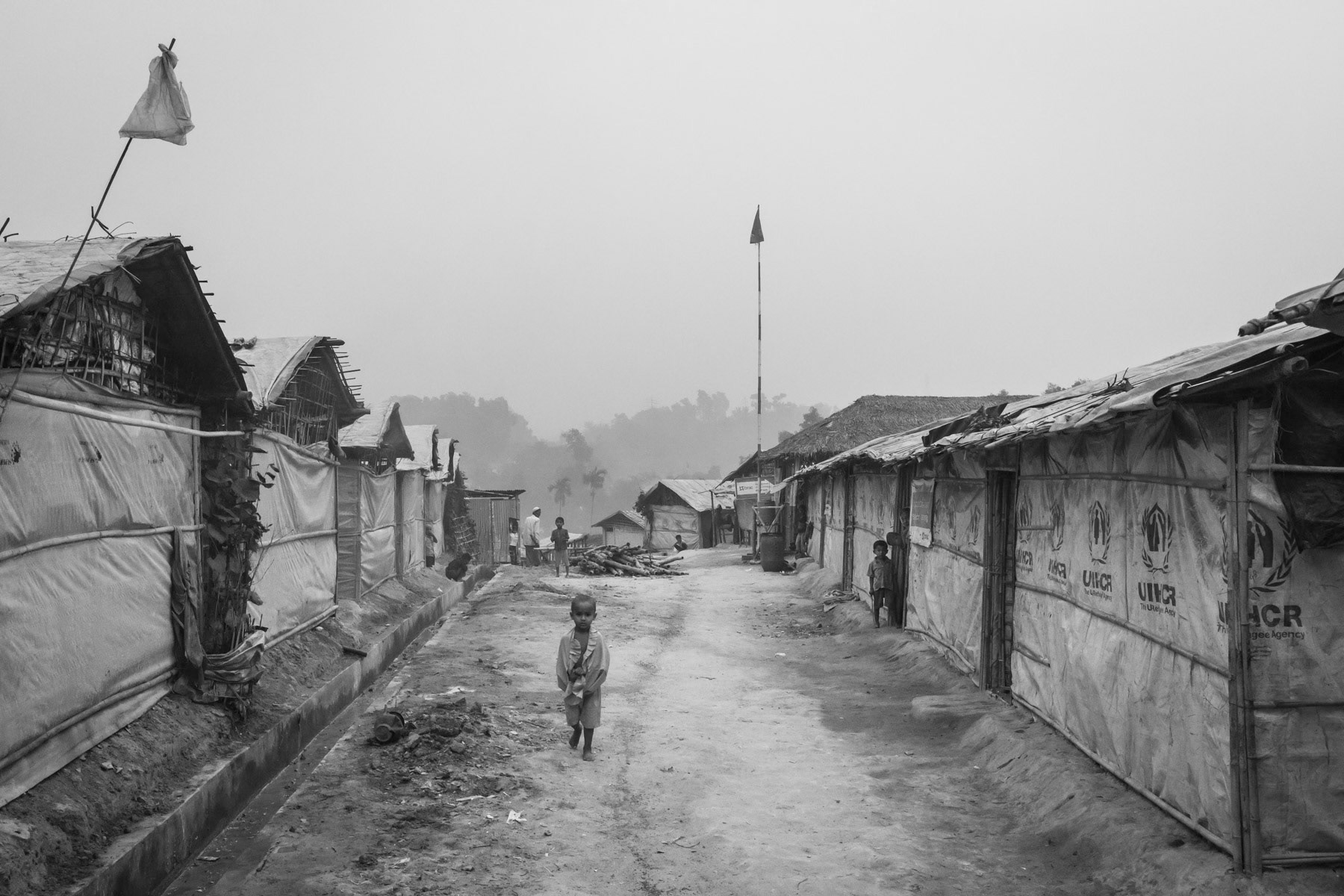
New makeshift blocks for the newly arrived Rohingya refugees from Myanmar. More than 650,000 refugees have fled persecution in neighbouring Myanmar since August 2017. Lambashiya section of Kutupalong refugee camp, Ukhiya, Bangladesh, March 2018
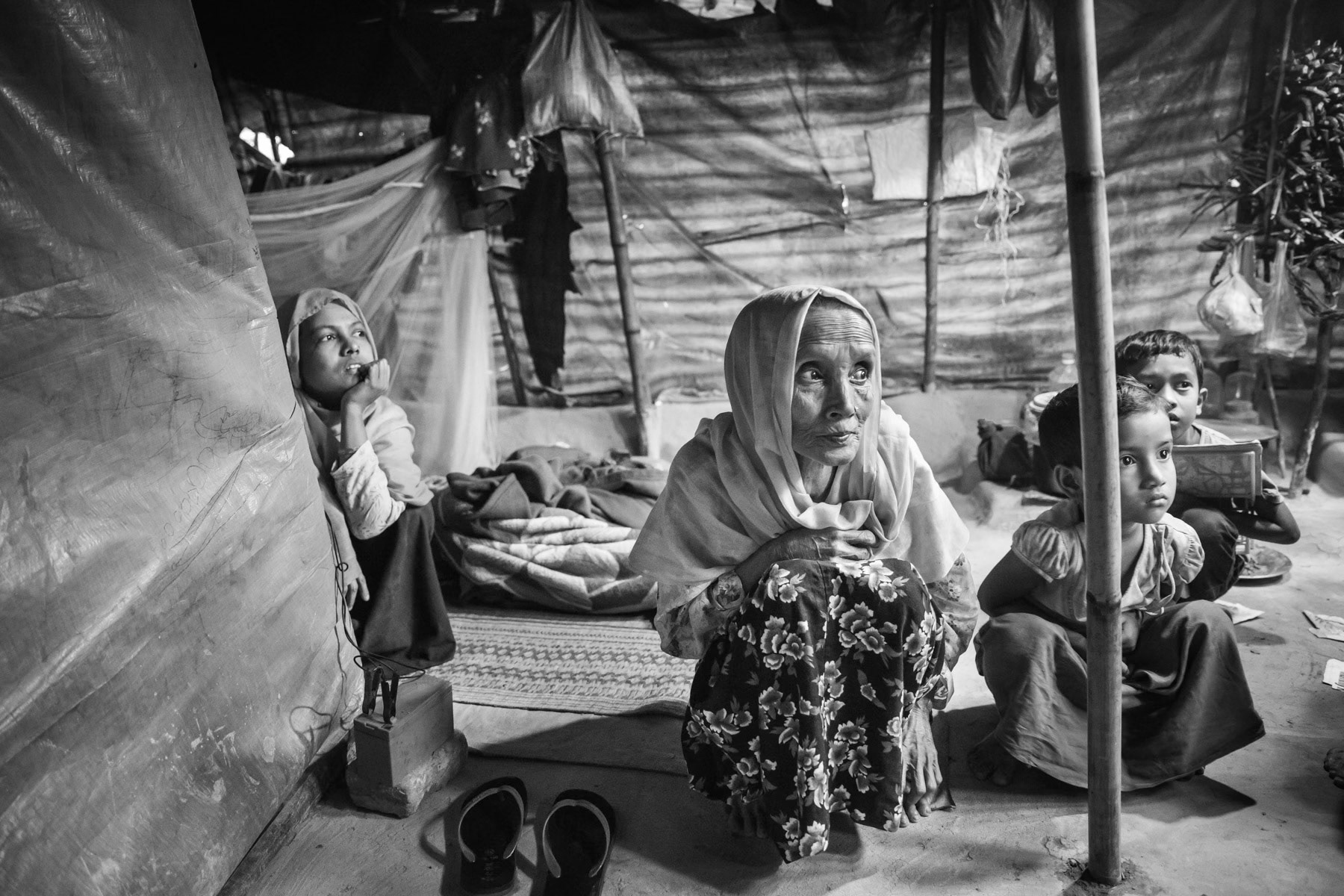
Rasheda Khatun, 60 years, from Dialtoli near Maungdaw in Rakhine. Feld to Bangladesh last September with surviving members of her family. Two of her sons, 3 grandsons and her daughter in law were killed when their village was attacked. All executed at the same moment and place. One son, daughter in law, and 3 grand children survived and are with her in Bangladesh. Her husband died 10 years ago of illness and lack of access to health care in Myanmar for the Rohingya. Balukhali refugee camp, Ukhiya, Bangladesh, March 2018
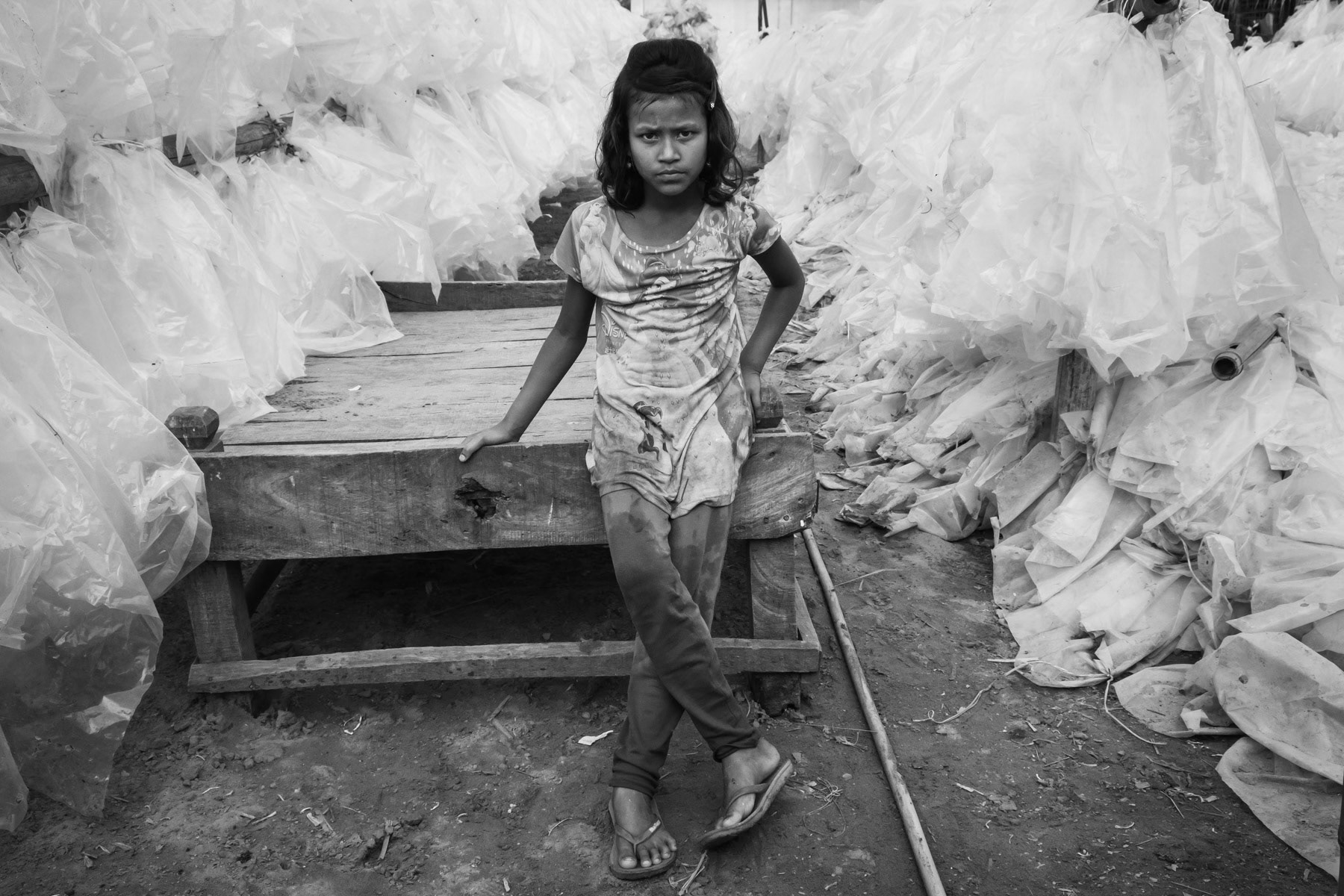
Rohingya girl working occasionaly at the fish drying areas near Cox's Bazar where numerous Rohingya refugees can find low paid jobs. Najirar Tak, Cox's Bazar, Bangladesh, March 2018
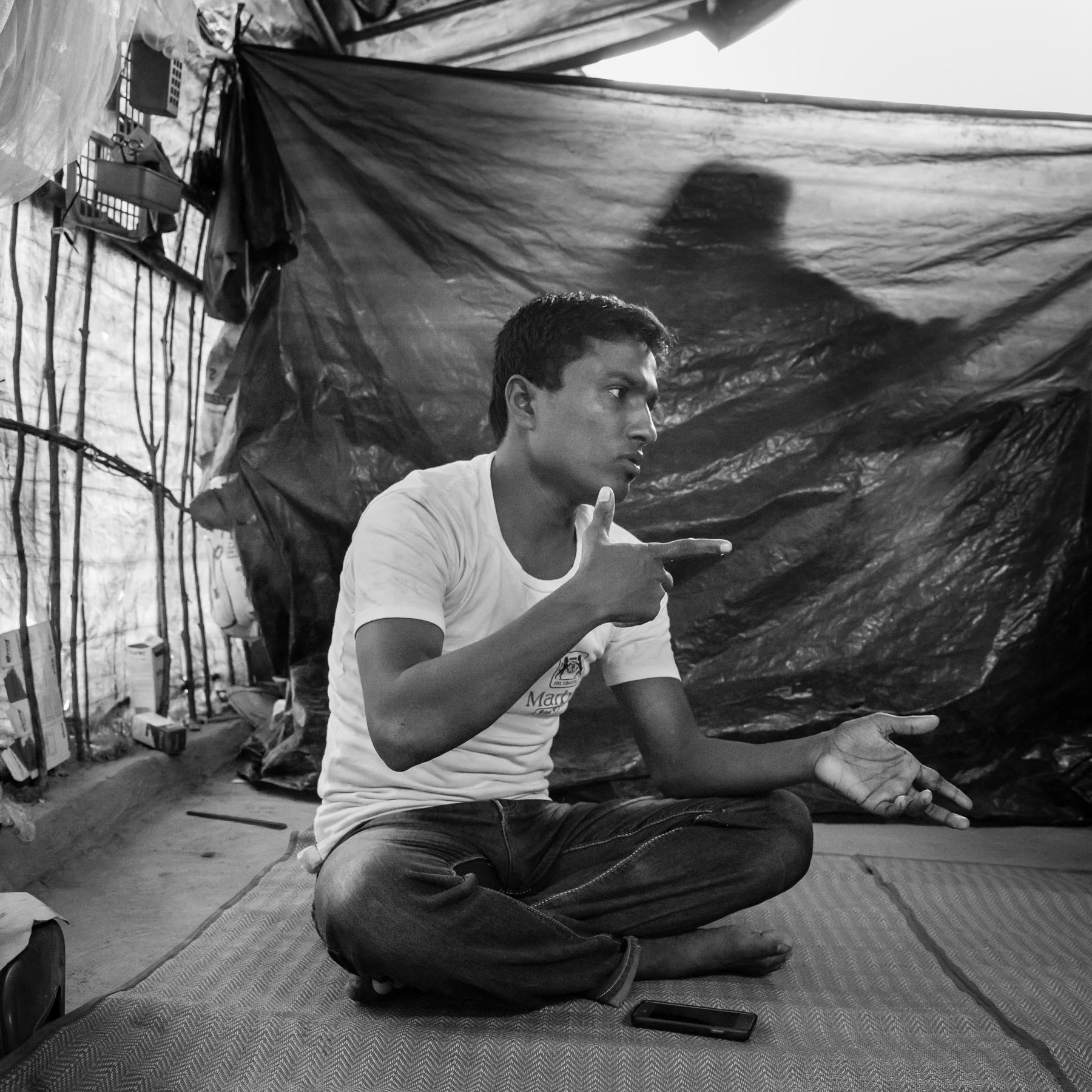
M.S from Boli Bazar, Maungdaw is 25 years and was enlisted to fight for ARSA (Arakan Rohingya Salvation Army). He received training to make rudimentary explosives and how to use a gun with nep guns. Joined ARSA in January 2017 after beeing influenced and recruited by a local village leader. The training camp was in the jungle. The objective of the training was to be able to defend their villages in case of attack. When the military attacked they had only improvised explosives that didn't work and didn't have guns. They were attacked by helicopter gunships. Twenty five ARSA members were present during the attack, he managed to escape, most got killed. According his estimate another 100 villagers got killed during the attack. He is now in the refugee camps along the border in Bangladesh, March 2018
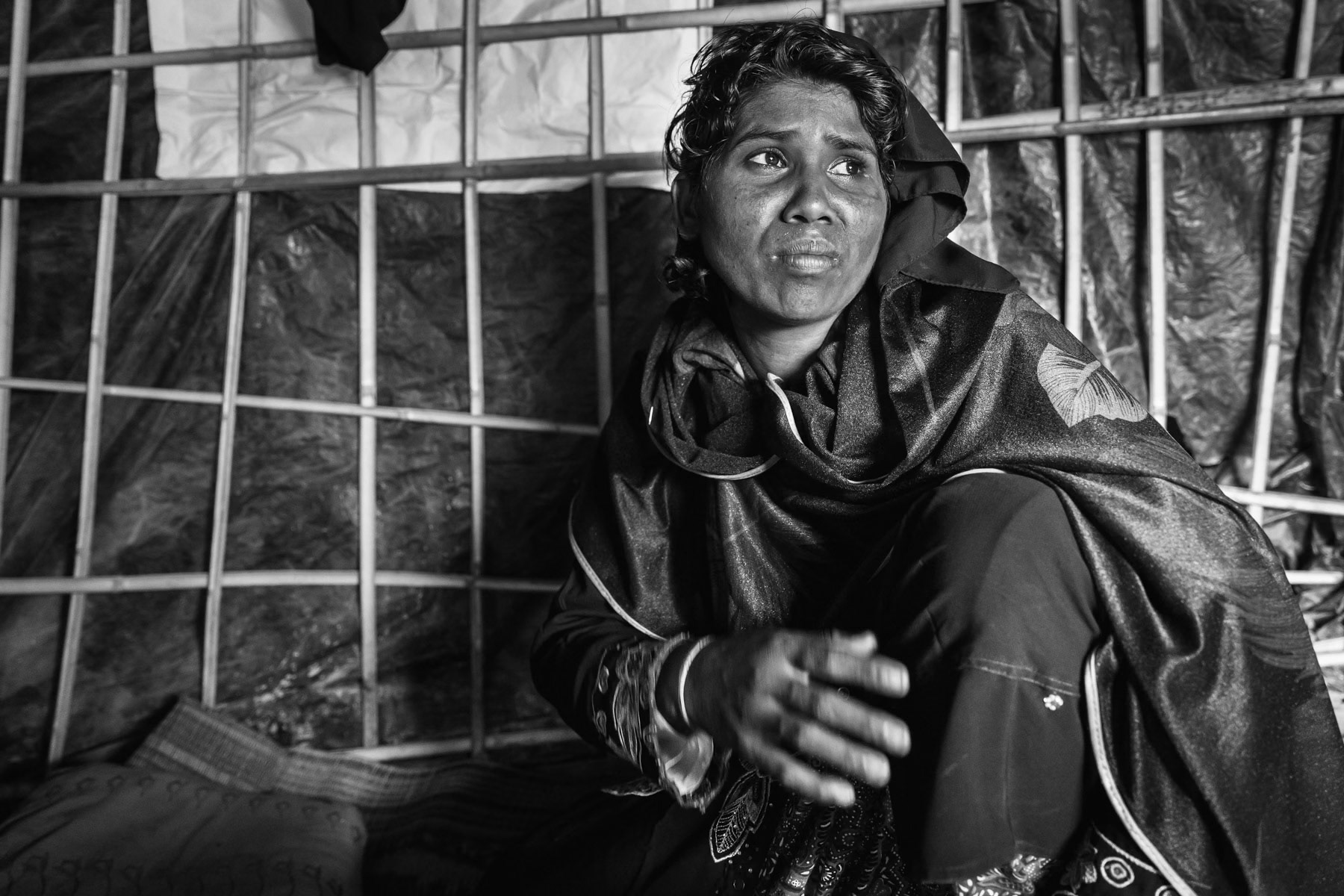
Dildar Begum, 30 years from Tula Toli. Her husband was executed in front of her, she was raped by 2 military. Her one year old child was killed by machette. One child of 10 years is with her in Bangladesh as he managed to run away when the military came to the village. She was assaulted with a machette to the head during the rape while trying to escape and left for dead. Neighbours came to her rescue and helped her reach Bangladesh. She arrived in September, and was for 3 months in hospital. Her parents and brother were also killed during the attack of Tula Toli. She has severe headaches as a result of the numerous wounds to her head. Tula Toli is one of the numerous Rohingya villages that have been totally wiped out and where severe acts of ethnic cleansing with genocidal intend have been committed by the military and local mobs. Balukhali refugee camp, Bangladesh, March 2018
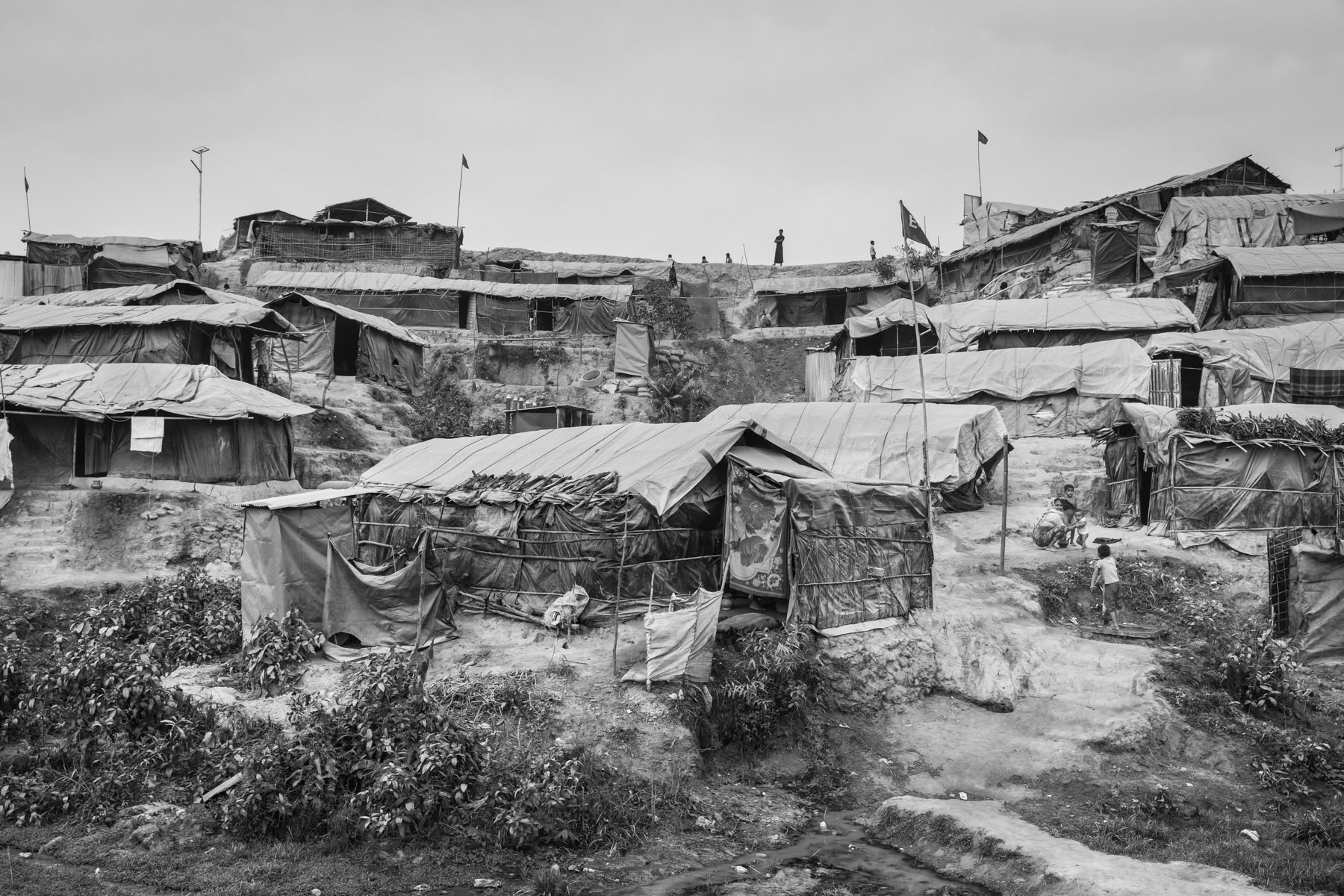
A new extension to the already overcrowded refugee camps to shelter part of the 650,000 newly arrived Rohingya refugees. The Rohingya refugee camps are now sheltering Rohingya victims of the 1978, 1992, 2008, 2012, 2016 and 2017 ethnic cleansing campaigns. By begining 2018 more than one million Rohingya refugees live in tha camps near Cox's Bazar making it the largest refugee camps in the world. Balukhali section, Ukhiya, Bangladesh, March 2018
